新世纪阅读教程第3册答案
新世纪阅读教程3答案u1u2
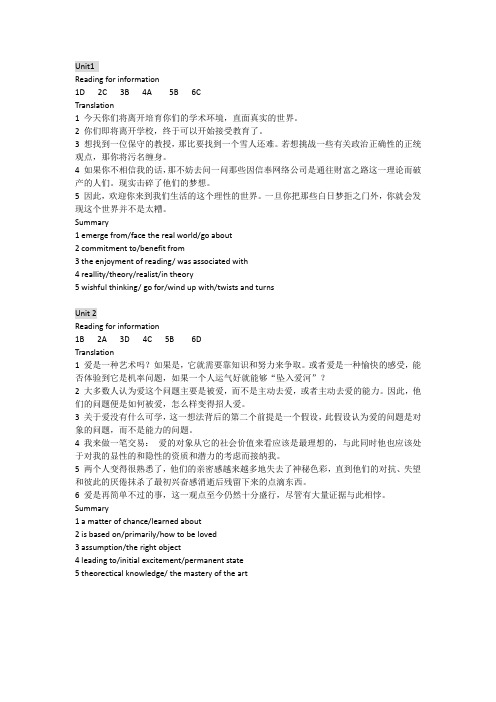
Unit1Reading for information1D 2C 3B 4A 5B 6CTranslation1 今天你们将离开培育你们的学术环境,直面真实的世界。
2 你们即将离开学校,终于可以开始接受教育了。
3 想找到一位保守的教授,那比要找到一个雪人还难。
若想挑战一些有关政治正确性的正统观点,那你将污名缠身。
4 如果你不相信我的话,那不妨去问一问那些因信奉网络公司是通往财富之路这一理论而破产的人们。
现实击碎了他们的梦想。
5 因此,欢迎你来到我们生活的这个理性的世界。
一旦你把那些白日梦拒之门外,你就会发现这个世界并不是太糟。
Summary1 emerge from/face the real world/go about2 commitment to/benefit from3 the enjoyment of reading/ was associated with4 reallity/theory/realist/in theory5 wishful thinking/ go for/wind up with/twists and turnsUnit 2Reading for information1B 2A 3D 4C 5B 6DTranslation1 爱是一种艺术吗?如果是,它就需要靠知识和努力来争取。
或者爱是一种愉快的感受,能否体验到它是机率问题,如果一个人运气好就能够“坠入爱河”?2 大多数人认为爱这个问题主要是被爱,而不是主动去爱,或者主动去爱的能力。
因此,他们的问题便是如何被爱,怎么样变得招人爱。
3 关于爱没有什么可学,这一想法背后的第二个前提是一个假设,此假设认为爱的问题是对象的问题,而不是能力的问题。
4 我来做一笔交易:爱的对象从它的社会价值来看应该是最理想的,与此同时他也应该处于对我的显性的和隐性的资质和潜力的考虑而接纳我。
5 两个人变得很熟悉了,他们的亲密感越来越多地失去了神秘色彩,直到他们的对抗、失望和彼此的厌倦抹杀了最初兴奋感消逝后残留下来的点滴东西。
新世纪大学英语系列教材阅读教程第三册练习答案
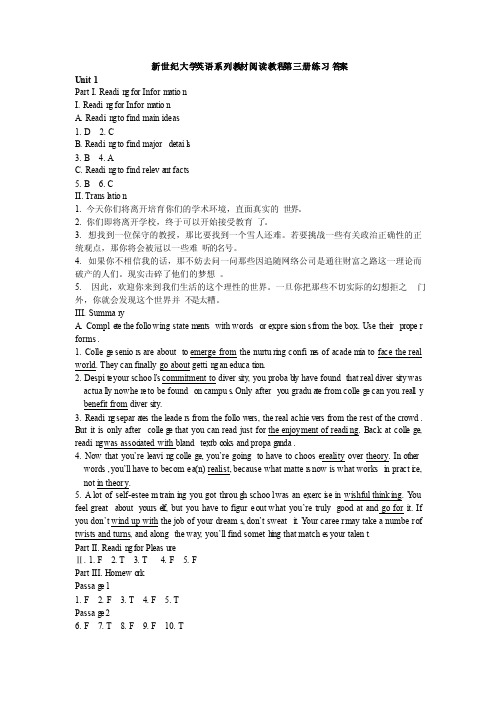
新世纪大学英语系列教材阅读教程第三册练习答案Unit 1Part I. Readin g for Inform ationI. Readin g for Inform ationA. Readin g to find main ideas1. D2. CB. Readin g to find majordetail s3. B4. AC. Readin g to find releva nt facts5. B6. CII. Transl ation1. 今天你们将离开培育你们的学术环境,直面真实的世界。
2. 你们即将离开学校,终于可以开始接受教育了。
3. 想找到一位保守的教授,那比要找到一个雪人还难。
若要挑战一些有关政治正确性的正统观点,那你将会被冠以一些难听的名号。
4. 如果你不相信我的话,那不妨去问一问那些因追随网络公司是通往财富之路这一理论而破产的人们。
现实击碎了他们的梦想。
5. 因此,欢迎你来到我们生活的这个理性的世界。
一旦你把那些不切实际的幻想拒之门外,你就会发现这个世界并不是太糟。
III. SummaryA. Comple te the follow ing statem ents with wordsor expres sions from the box. Use thei r proper forms.1. Colleg e seniors are about to emerge from the nurturi ng confin e s of academ ia to face the real world. They can finall y go aboutgettin g an educati on.2. Despit e your school‘s commit mentto diversi ty, you probab l y have found that real diversi ty was actual ly nowhere to be foundon campus. Only after you gradua te from colleg e can you real ly benefi t from diversi ty.3. Readin g separa tes the leaders from the followers, the real achievers from the rest of the crowd. But it is only after colleg e that you can read just for the enjoym ent of readin g. Back at coll ege, readin g was associ atedwith blandtextbo oks and propag anda.4. Now that you‘re leavin g college, you‘re goingto have to choose realit y over theory. In otherwords, you‘ll have to become a(n) realis t, becaus e what matter s now is what worksi n practi c e, not in theory.5. A lot of self-esteem traini ng you got throug h school was an exerci s e in wishfu l thinki ng. Y ou feel greatabout yourse l f, but you have to figure out what you‘re trulygood at and go for it. If you don‘t wind up with the job of your dreams, don‘t sweati t. Y our career may take a number of twists and turns, and alongthe way, you‘ll find someth i ng that matche s your talent.Part II. Readin g for Pleasu reⅡ. 1. F 2. T 3. T 4. F 5. FPart III. Homewo rkPassag e 11. F2. F3. T4. F5. TPassag e 26. F7. T8. F9. F 10. TPassag e 311. D 12. A13. B 14. D 15. CPassag e 416. B 17. A18. C 19. C 20. BPassag e 521. equate22. like 23. assume d 24. modestl y 25. accumul ated26. means27. lucrati ve 28. debt 29. afford30. neighb orhoo dsPassag e 631. internation al 32.tongue33. though34. dispersed 35. consid erabl y36. geogra phica l 37. entire38. glance39. proposed 40. ground sPassag e 741. recede s 42. seduce s 43. dimensions44. shifts45. rare46. delive red 47.confus ing 48. conservativ e 49. fashio n50. fineUnit 2Part I. Readin g for Inform ationI. Readin g for Inform ationA. Readin g to find main ideas1. B2. AB. Readin g to find majordetail s3. D4. CC. Readin g to find releva nt facts5. B6. DII. Transl ation爱是再简单不过的事,这一观点至今仍然十分盛行,尽管大量事实都对此予以否定。
新世纪大学英语阅读教程第三册练习答案__Units5-8
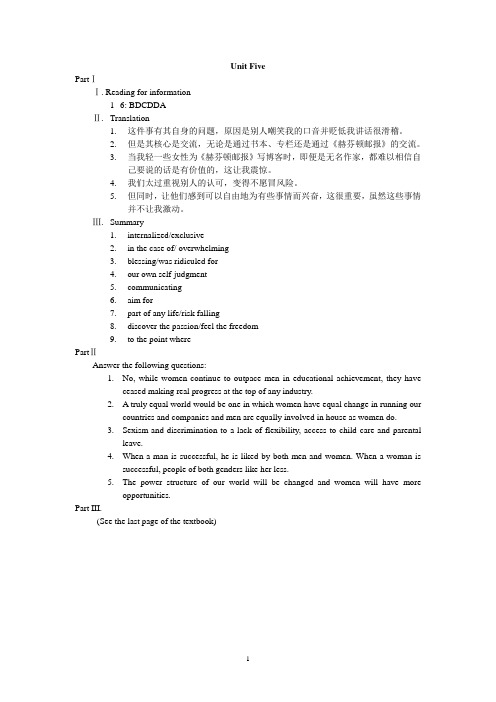
PartⅠⅠ. Reading for information1--6: BDCDDAⅡ. Translation1.这件事有其自身的问题,原因是别人嘲笑我的口音并贬低我讲话很滑稽。
2.但是其核心是交流,无论是通过书本、专栏还是通过《赫芬顿邮报》的交流。
3.当我轻一些女性为《赫芬顿邮报》写博客时,即便是无名作家,都难以相信自己要说的话是有价值的,这让我震惊。
4.我们太过重视别人的认可,变得不愿冒风险。
5.但同时,让他们感到可以自由地为有些事情而兴奋,这很重要,虽然这些事情并不让我激动。
Ⅲ. Summary1.internalized/exclusive2.in the case of/ overwhelming3.blessing/was ridiculed for4.our own self-judgmentmunicating6.aim for7.part of any life/risk falling8.discover the passion/feel the freedom9.to the point wherePartⅡAnswer the following questions:1.No, while women continue to outpace men in educational achievement, they haveceased making real progress at the top of any industry.2. A truly equal world would be one in which women have equal change in running ourcountries and companies and men are equally involved in house as women do.3.Sexism and discrimination to a lack of flexibility, access to child care and parentalleave.4.When a man is successful, he is liked by both men and women. When a woman issuccessful, people of both genders like her less.5.The power structure of our world will be changed and women will have moreopportunities.Part III.(See the last page of the textbook)Part IⅠ. Reading for information1--6: BACCDCⅡ.Translation1.我定了一个规矩:在职期间尽可能避免担任任何会被公众团体审阅的文件的起草人。
新世纪大学英语阅读教程3阅读part1翻译U1-U7
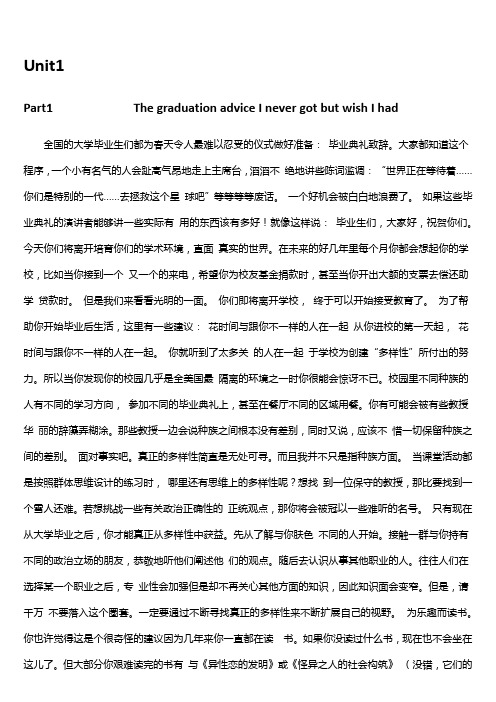
Unit1Part1 The graduation advice I never got but wish I had 全国的大学毕业生们都为春天令人最难以忍受的仪式做好准备:毕业典礼致辞。
大家都知道这个程序,一个小有名气的人会趾高气昂地走上主席台,滔滔不绝地讲些陈词滥调:“世界正在等待着……你们是特别的一代……去拯救这个星球吧”等等等等废话。
一个好机会被白白地浪费了。
如果这些毕业典礼的演讲者能够讲一些实际有用的东西该有多好!就像这样说:毕业生们,大家好,祝贺你们。
今天你们将离开培育你们的学术环境,直面真实的世界。
在未来的好几年里每个月你都会想起你的学校,比如当你接到一个又一个的来电,希望你为校友基金捐款时,甚至当你开出大额的支票去偿还助学贷款时。
但是我们来看看光明的一面。
你们即将离开学校,终于可以开始接受教育了。
为了帮助你开始毕业后生活,这里有一些建议:花时间与跟你不一样的人在一起从你进校的第一天起,花时间与跟你不一样的人在一起。
你就听到了太多关的人在一起于学校为创建“多样性”所付出的努力。
所以当你发现你的校园几乎是全美国最隔离的环境之一时你很能会惊讶不已。
校园里不同种族的人有不同的学习方向,参加不同的毕业典礼上,甚至在餐厅不同的区域用餐。
你有可能会被有些教授华丽的辞藻弄糊涂。
那些教授一边会说种族之间根本没有差别,同时又说,应该不惜一切保留种族之间的差别。
面对事实吧。
真正的多样性简直是无处可寻。
而且我并不只是指种族方面。
当课堂活动都是按照群体思维设计的练习时,哪里还有思维上的多样性呢?想找到一位保守的教授,那比要找到一个雪人还难。
若想挑战一些有关政治正确性的正统观点,那你将会被冠以一些难听的名号。
只有现在从大学毕业之后,你才能真正从多样性中获益。
先从了解与你肤色不同的人开始。
接触一群与你持有不同的政治立场的朋友,恭敬地听他们阐述他们的观点。
随后去认识从事其他职业的人。
往往人们在选择某一个职业之后,专业性会加强但是却不再关心其他方面的知识,因此知识面会变窄。
新世纪大学英语综合教程3课后答案Unit1---精品模板

Unit OnePeople Around UsEnhance Your Language AwarenessWords in Action▆ Working with Words and Expressions1.In the box below are some of the words you have learned in this unit。
Complete the followingsentences with them. Change the form where necessary。
▆ Answers:1) crease2) hint3) assured4) awaiting5) hovering6) scrawled7) glistening8) frail9) sole10) visible11) engaged12) biased13) dreading14) grinning2.In the boxes below are some of the expressions you have learned in this unit. Do you know how to usethem in the proper context? Now check for yourself by doing the blank—filling exercise. Change the form where necessary.▆ Answers:1) for fear of2) pulled up3) except for4) get by5) make a living6) every so often7) in the background8) Shut off9) each and every10) as it is11) wraps … around her little finger12) caught us …unawares▆Increasing Y our Word Power1.Choose the definition from Column B that best matches each phrasal verb in Column A, payingattention to the V+ Prep。
新世纪大学英语综合教程3课后答案Unit2分析解析
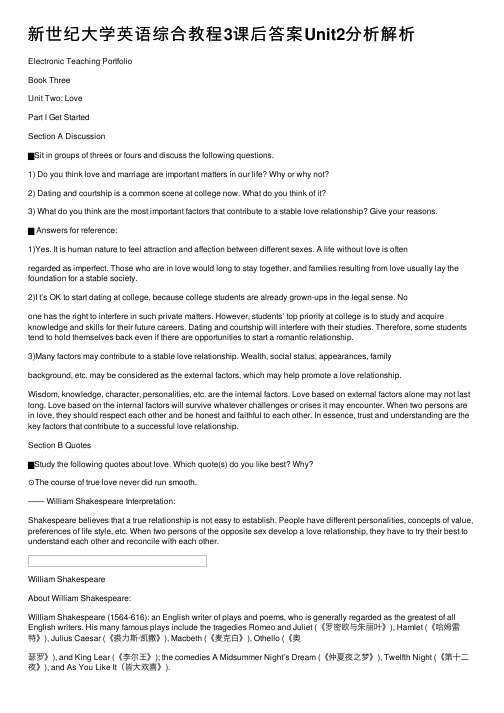
新世纪⼤学英语综合教程3课后答案Unit2分析解析Electronic Teaching PortfolioBook ThreeUnit Two: LovePart I Get StartedSection A Discussion▇Sit in groups of threes or fours and discuss the following questions.1) Do you think love and marriage are important matters in our life? Why or why not?2) Dating and courtship is a common scene at college now. What do you think of it?3) What do you think are the most important factors that contribute to a stable love relationship? Give your reasons.▇ Answers for reference:1)Yes. It is human nature to feel attraction and affection between different sexes. A life without love is oftenregarded as imperfect. Those who are in love would long to stay together, and families resulting from love usually lay the foundation for a stable society.2)I t’s OK to start dating at college, because college students are already grown-ups in the legal sense. Noone has the right to interfere in such private matters. However, students’ top priority at college is to study and acquire knowledge and skills for their future careers. Dating and courtship will interfere with their studies. Therefore, some students tend to hold themselves back even if there are opportunities to start a romantic relationship.3)Many factors may contribute to a stable love relationship. Wealth, social status, appearances, familybackground, etc. may be considered as the external factors, which may help promote a love relationship.Wisdom, knowledge, character, personalities, etc. are the internal factors. Love based on external factors alone may not last long. Love based on the internal factors will survive whatever challenges or crises it may encounter. When two persons are in love, they should respect each other and be honest and faithful to each other. In essence, trust and understanding are the key factors that contribute to a successful love relationship.Section B Quotes▇Study the following quotes about love. Which quote(s) do you like best? Why?⊙The course of true love never did run smooth.—— William Shakespeare Interpretation:Shakespeare believes that a true relationship is not easy to establish. People have different personalities, concepts of value, preferences of life style, etc. When two persons of the opposite sex develop a love relationship, they have to try their best to understand each other and reconcile with each other.William ShakespeareAbout William Shakespeare:William Shakespeare (1564-616): an English writer of plays and poems, who is generally regarded as the greatest of all English writers. His many famous plays include the tragedies Romeo and Juliet (《罗密欧与朱丽叶》), Hamlet (《哈姆雷特》), Julius Caesar (《裘⼒斯·凯撒》), Macbeth (《麦克⽩》), Othello (《奥瑟罗》), and King Lear (《李尔王》); the comedies A Midsummer Night’s Dream (《仲夏夜之梦》), Twelfth Night (《第⼗⼆夜》), and As You Like It(皆⼤欢喜》).⊙To fear love is to fear life, and those who fear life are already three parts dead.—— Bertrand Russell Interpretation:Here Russell emphasizes the importance of an active attitude towards love. We should not be afraid to fall in love just because it is not easy to find true love or just because of any possible setbacks. A life without love is as dull as a dying man because he lacks the energy and passion to enjoy life.Bertrand RussellAbout Bertrand Russell:Bertrand Russell (1872-970): a British philosopher and mathematician who developed new ideas connecting mathematics and logic. He is also known for being a pacifist (和平主义者). He received the Nobel Prize for Literature in 1950.⊙Where does the family start? It starts with a young man falling in love with a girl — no superior alternative has yet been found.—— Sir Winston Churchill Interpretation:The quotation emphasizes that true love is the only basis upon which a happy family is built. Only when the man and the woman love each other dearly and devotedly can they endure trials and tribulations in their common effort to build up a happy family.Sir Winston ChurchillAbout Sir Winston Churchill:Sir Winston Churchill (1874-965): a British statesman, soldier, and author who was Prime Minister during most of World War II and again from 1951 to 1955. He is remembered and admired by most British people as a great leader who made possible Britain’s victory in the war. He is also famous for the many speeches he made during the war. In 1953 Churchill was awarded the Nobel Prize in Literature for his writing and oratory (演讲术).⊙It is not how much we do, but how much love we put in the doing. It is not how much we give, but how much love we put in the giving.—— Mother Teresa Interpretation:The quotation tells us the significant role that love plays in everything we do in life. Whatever we do, we should put adequate love into it so that others can feel our love and be affected by our love. What we can offer to others may be insignificant, but as long as there is love in it, the benefit will be significant. Here, love isunderstood in a broad sense.Mother TeresaAbout Mother Teresa:Mother Teresa (1910-997): an Albanian (阿尔巴尼亚) Roman Catholic nun (修⼥) who lived in India, where she worked to help the poor and the sick in the city of Calcutta (加尔各答). She won the Nobel Prize for Peace in 1979, and people think of her as a typical example of someone who is kind, unselfish, and morally good. Section C Watching and Discussion▇He's Just Not That Into You is a 2009 romantic comedy film about how nine people in Baltimore deal with their romantic problems. Watch the following video clip extracted from this film and then complete the tasks that follow:1.Pay attention to what the woman says in the video clip and fill in the missing words.I. See, you can’t keep being nice to me and I can’t keep pretending like this is something that it’s not.We’ve been t ogether over seven years. You know me. You know who I am. You either wanna marry me or you don’t.II. …for every woman that has been told by some man that he doesn’t believe in marriage and then six months later, he’smarried to some twenty-four-year-old that he met at the gym.III. It’s coming from the place that I have been hiding from you for about five years. About five years because I haven’t wanted to seem demanding, and I haven’t wanted to seem clingy or psycho orwhatever. So I have never asked you.2.What can you infer from the conversation between the man and the woman in the video clip?▇Answers for reference:(Open.)Script:BETH:Now. I want you to stop doing anything nice.NEIL: This feels like a trick.BETH: No. No. I just, I just need you to stop being nice to me —unless you’re gonna marry me after.(Neil laughs.)BETH: Is that funny? Do you think that’s funny?NEIL: No. I guess it is not funny.BETH:See, you can’t keep being nice to me and I can’t keep pretending like this is something that it’s not.We’ve been together for over seven years. You know me. You know who I am. You either wanna marry me or you don’t. NEIL: Or there is the possibility that I mean it when I say I don’t believe in marriage.BETH: Bullshit! Bullshit! Come on! Bullshit for every woman that has been told by some man that he doesn’t believe in marriage and then six months later, he’s married to some twenty-four-year-old that he met at the gym. It’s just —it’s Bullshit. (Beth tries to hold back her tears. Neil looks stunned and goes to her.)NEIL: Where is this coming from?BETH: It’s coming f rom the place that I have been hiding from you for about five years. About five years because I haven’t wanted to seem demanding, and I haven’t wanted to seem clingy or psycho orwhatever. So I have never asked you. But I — but I — I have to. I mean, are you — are you ever going to marry me?Part II Listen and RespondSection A Word Bank(⽆)Section B Task One: Focusing on the Main IdeasChoose the best answer to each of the following questions according to the information contained in the listening passage.1) Where did the woman see the three old men?A) In front of her store.B) In her front yard.C) In her dream.D) In her doorway.2) Who were the three old men respectively?A) Success, Hope and Wealth.B) Faith, Hope, and Love.C) Wealth, Faith and Success.D) Love, Success and Wealth.3) Whom did the family invite in?A) Wealth.B) Love.C) Success.D) All of the above.4) How many of the old men would like to go into the house?A) One.B) Two.C) Three.D) Four.5) What is the main idea of the passage?A) Where there is love, there is wealth and success.B) One cannot live without wealth, love and success.C) Love is as important as wealth and success.D) Wealth and success are what people pursue most eagerly.▇ Answers for Reference:1) B 2) D 3) B 4) C 5) ASection C Task Two: Zooming in on the Details▇Listen to the recording again and fill in each of the blanks according to what you have heard.1) The woman thought that the three old men must be ____________, so she invited them to come in and have something __________.2) The old men said that they did not go into a house ________________.3) The husband wished to invite ________________, but the woman did not agree and wished to have_____________ , while their daughter suggested: “____________________________________?”4) The woman came out and asked: “Which one of you is________? Please come in and be our________.”5) The other two old men also got up and followed, which_________ the woman.6) One old man t old the woman: “If you had invited _________ or _________, the other two of us would__________.”▆ Answers:1) The woman thought that the three old men must be hungry, so she invited them to come in and have something to eat.2) The old men said that they did not go into a house together.3) The husband wished to invite Wealth, but the woman did not agree and wished to have Success, while their daughter suggested: “Wouldn’t it be better to invite Love?”4) The woman came out and asked: “Which one of yo u is Love? Please come in and be our guest.”5) The other two old men also got up and followed, which surprised the woman.6) One old man told the woman: “If you had invited Wealth or Success, the other two of us would havestayed out.”Script:An InvitationA woman saw three old men sitting in her front yard. She said, “I don’t think I know you, but you must be hungry. Please come in and have something to eat.”“We do not go into a house together,” they replied.“Why is that?” she wanted to know.On e of the old men explained: “His name is Wealth, this is Success, and I am Love.” Then he added, “Now go in and discuss with your husband which one of us you want in your home.”Then the woman went in and told her husband what was said. Her husband said, “Let’s invite Wealth. Let him come and fill our home with wealth.” His wife disagreed, “My dear, why don’t we invite Success?” Then the daughter made a suggestion:“Wouldn’t it be better to invite Love? Our home will then be filled with love.” “Let’s take our daughter’s advice,” said the father. So the woman went out and asked, “Which one of you is Love? Please come in and be our guest.” Love got up and started walking toward the house. The other two also got up and followed him. Surprised, the lady asked W ealth and Success: “I only invited Love. Why are you coming in?”The old men replied together: “If you had invited Wealth or Success, the other two of us would have stayed out, but since you invited Love, wherever HE goes, we go with him. Wherever there is Love, there is also Wealth and Success.”Part III Read and ExploreText ASection A Discovering the Main Ideas1. Answer the following questions with the information contained in Text A.1) Is “love” easy to define? Why or why not?2) How does the au thor describe “puppy loves”?3) What does it take for love to develop into maturity?4) What helped preserve the holiness of love in the author’s parents’ generation?5) What negative roles do the media play in forming the younger generation’s view of lov e?6) What do young people today tend to value in relationships? What does the author think they should value? ▆ Answers for Reference:1) No. It is because love is a feeling that can only be felt but cannot be clearly described.2) “Puppy loves” are brief, silly, adventurous but harmless.3) Love takes time to blossom and it takes a lot of understanding, caring, sharing and affection to developinto maturity.4) It was the distance between men and women that helped preserve the holiness of love in the author’sparents’ generation.5) The media have exposed the younger generation to things that have fast paced their sensibilities so muchthat taking things slow requires effort.6) They tend to value physical beauty, closeness, passion and acquiring. The author thinks that they shouldvalue inner charm, intimacy, emotion and sharing.2.Text A can be divided into four parts with the paragraph number(s) of each part provided as follows. Write down the main idea of each part.Paragraph(s) Main IdeaPart One 1-2 ________________________________________________________________________________________________________________________________________________ Part Two 3-7________________________________________________________________________________________________________________________________________________ Part Three 8-12________________________________________________________________________________________________________________________________________________ Part Four 13-14________________________________________________________________________________________________________________________________________________▆ Answers for Reference:Paragraph(s) Main IdeaPart One 1-2 Love is hard to define because it can only be felt but not described.Part Two 3-7 The author discusses love of different depths from her own experiences.Part Three 8-12 The two generations handle love and relationships differently. The younger generation tends to be more hasty and selfish in building relationships.Part Four 13-14 The author advises young people to learn the essence of love and find ways to develop relationships into lifelong bonds.Section B In-Depth StudyLove is an overwhelming joy that is beyond description. It is human nature to yearn for and indulge in love, but true love takes a lot of understanding, much sharing and caring, and plenty of affection. What is true love? How deep is your love? The author shares her views with the younger generation on these questions.How Deep Is Your Love?Mansi Bhatia1Love to some is like a cloudTo some as strong as steelFor some a way of livingFor some a way to feelAnd some say love is holding onAnd some say let it goAnd some say love is everythingSome say they don’t know2 At some stage or the other in our lives we experience the gnawing pangs of an emotion which defies definition. It’s a feeling that can only be felt and not described. An overwhelming joy that comes together with its share of sadness. Love.3 Given the busy nature of our lives, it’s to be appreciated that we even find the time to ind ulge in matters of the heart.But at the same time I wonder if we even understand its true depth. I remember having countless crushes while in school. My math teacher, our neighbour’s son, my best friend’s brother and lots of others whom I fancied for the colour of their eyes, the shape of their moustaches or just the way they walked. Harmless puppy loves that are as brief as soap bubbles. I can laugh about all those silly and adventurous thoughts and acts now but at that time nothing could be more serious an affair for me. Then came the stage of real relationships.4 Being in an all girls’ school I hardly had the opportunity to interact with members of the opposite gender. Socials between our school and the boys’ college, therefore, would be awaited anxio usly. Those three hours of unhesitant attention by a group of well-groomed young gentlemen provided us with enough content to talk and feel exhilarated about for the next four weeks.5 And even then there was no real need of having a boyfriend.6 I somehow grew up believing that love would happen when it had to. And sure enough it did. It came at an age when I hada career, a long-term plan and a more or less settled life (and now I am not yet 25!). I was mature enough to enter a relationship which demands a lot of give and not so much of take.7 Love was a magnificent building I built on the foundation of friendship. It took time to blossom. It took a lot of understanding, loads of sharing and caring, and plenty of affection to become what it is today. And it meant a meeting of minds. You might say that I belong to the traditional school of romance. But in my opinion, love needs to be nurtured. And it has to be distinguished from the intense but short-lived love or the pleasures of the flesh.8 Our p arents’ generation was fed lavishly with ideals. It was an era of constraints, restraints, respect, admiration, and plenty of romance. The long skirts, the quiet and unpretentious looks, the curled long hair, the calmness, the shy glance—these are all so frequently remindful of a bygone era. An age when the distance between the sexes somehow managed to help preserve the holiness of love and relationships.9 The younger generation, with its openness and fading lines of proximity, has jumped on the bandwagon of love with so much haste that it is difficult for them to distinguish between physical attraction and mental compatibilities. What we have been exposed to via the media have fast paced our sensibilities so much that taking things slow requires effort on our parts.10 I am amazed when I hear stories of school kids bragging about the number of physical relationships they have had. I am horrified to learn that girls barely eighteen have already been in and out of seven to eight “hook ups”.11 I am sorry to learn about the kind of emotional baggage these kids are carrying in what are purely unemotional relationships. Some might blame the current state of affairs on peer pressure. But has anyone ever stopped to figure out where this peer pressure originates? Do any of us try and understand who is responsible for this shift? Does anyone bother to study the state of mind of the teenagers?12 The mindset of this generation is all too evident in the way it handles its personal life.There are more relationships being distorted under the pressures of lust than ever before. There is more focus on physical beauty than on inner charm. There is more of closeness and less of intimacy. There is more of passion and less of emotion. There is more of acquiring and less of sharing. There is more of opportunism and less of selflessness.In short, there is more of ME and less of US.13 We have hardened ourselves so much in this competitive age that we have forgotten the essence of relationships. There’s much more to being someone’s lover than gifting them red roses and fifty-cent cards. What about gifting our object of affection, our time, our company, our support, our friendship? What about setting priorities in our lives and focusing on each with sincerity? What about trying to be self-sufficient emotionally before letting ourselves loose? What about giving ourselves, and others, time and space to forge relationships? What about working towards meaningful and lasting friendships? What about honouring our commitments? What about channeling our energies and emotions towards building lifelong bonds ratherthan wasting them on seasonal relationships?14 We have but one life and we must experience everything that can make us stronger. True love happens once in a lifetime. And we should not have become so tired by our frivolous acts that when it comes we aren’t able to receive it with open arms.▇课⽂参考译⽂你的爱有多深曼茜·巴蒂亚1 有⼈认为爱如浮云有⼈认为爱坚强如铁有⼈认为爱是⼀种⽣活⽅式有⼈认为爱是⼀种感觉有⼈说爱要执着有⼈说爱不要约束有⼈说爱是⽣命的全部有⼈说不知道爱为何物2 在我们⽣命中的某个阶段,我们会经历某种难以名状的情感所带来的阵阵折磨。
新世纪阅读教程3册第1单元
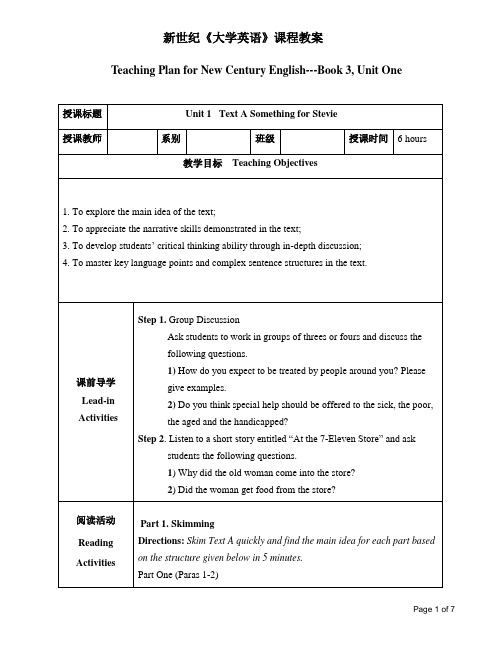
get/be done withbe finished with做完,结束
e.g.1.Pass me the newspaper after you are done with it.
2.You’ll be surprised how much stuff you can get done with a bit of volunteer offline time.
2)Do you think special help should be offered to the sick, the poor, the aged and the handicapped?
Step 2.Listen to a short story entitled “At the 7-Eleven Store”and ask students thefollowingquestions.
Part Two (Paras 3-5)
The author’s worries vanished when he found that Stevie was very pleasing, hardworking and very attentive, and consequently he became popular with the author’s staff and regular customers.
2.He decided not to approach her for fear of rejection.
他因怕遭拒绝决定不再去找她。
dreadvt.feel great fear or anxiety about害怕,恐惧;担心
e.g.1.The old ladydreaded being all alone in that big house.
新世纪大学英语系列教材综合教程book3unit1答案
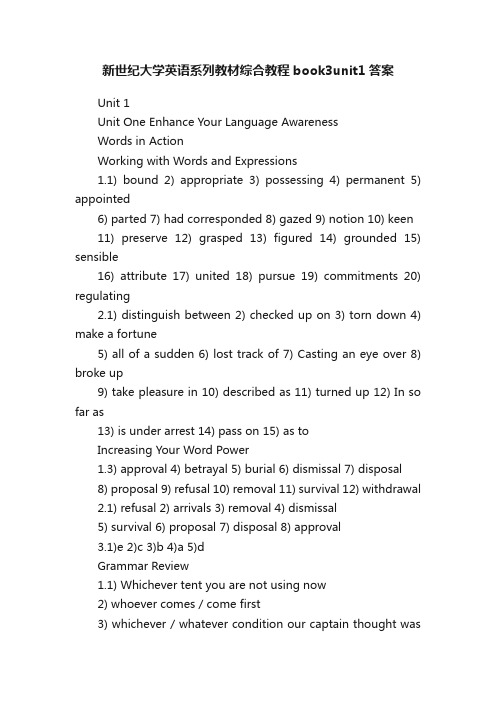
新世纪大学英语系列教材综合教程book3unit1答案Unit 1Unit One Enhance Your Language AwarenessWords in ActionWorking with Words and Expressions1.1) bound 2) appropriate 3) possessing 4) permanent 5) appointed6) parted 7) had corresponded 8) gazed 9) notion 10) keen11) preserve 12) grasped 13) figured 14) grounded 15) sensible16) attribute 17) united 18) pursue 19) commitments 20) regulating2.1) distinguish between 2) checked up on 3) torn down 4) make a fortune5) all of a sudden 6) lost track of 7) Casting an eye over 8) broke up9) take pleasure in 10) described as 11) turned up 12) In so far as13) is under arrest 14) pass on 15) as toIncreasing Your Word Power1.3) approval 4) betrayal 5) burial 6) dismissal 7) disposal8) proposal 9) refusal 10) removal 11) survival 12) withdrawal2.1) refusal 2) arrivals 3) removal 4) dismissal5) survival 6) proposal 7) disposal 8) approval3.1)e 2)c 3)b 4)a 5)dGrammar Review1.1) Whichever tent you are not using now2) whoever comes / come first3) whichever / whatever condition our captain thought wasthe best4) Wherever / No matter where I go5) whatever wishes their child / children expresses / express6) However disappointed / No matter how disappointed you may feel about the surroundings/ environment / situation7) Whoever breaks it8) whenever he concentrates on a problem2.1) It is not luck but hard work that led him to today’s success.2) Prof. Moen argues that it is energy that makes the world go round.3) It was not until he had proved he was honest that he won the family’s trust.4) It was clearly the headmaster himself who / that opened the door for me5) NoneCloze1) classical 2) notion 3) utility 4) ground 5) occurs6) goodness 7) as to 8) possesses 9) preserve 10) bound11) mirror 12) virtuous 13) commitment 14) moral excellenceTranslation1.1) The friendship grounded on common / shared interest does not break easily. / It is noteasy for the friendship grounded on common / shared interest to break up.2) Children must learn to distinguish between violence and bravery / courage in computergames.3)There spring up so many new things every day in the worldthat it is no longer sensible toexpect a person to know / keep track of everything.4) Laws do not regulate such things as betrayal to friends; that is why there is what we call /is called “the court of morality”.5)Today’s culture is described as “fast-food culture”. Whatever they may be / are doing,people just pursue the greatest / maximum satisfaction within the shortest time.6) As the saying goes, there is no such thing as a free lunch. If you want something, go andearn / work for it.2.As is commonly acknowledged / It is commonly recognized that humans are socialanimals. Bonded together in a community, we naturally expect to have friends. As to what friendship is, people have different notions / ideas. Some make friends for mutual utility.Once the ground for such friendship disappears the friendship also breaks up. However, a lot of people long for “soul pals”—those who possess virtues and with whom we can go through trials and tribulations together. Such friendships keep us away from greed and violence and encourage us to have the courage of our convictions. Such is what we call “tr ue and perfect friendship”.Theme-related WritingSample Essay One:Bob and I became brother-like friends in our childhood. We played, dined and discussed our ambitions together. Once grown up, he started for the West to make his fortune while I became a policeman in New York. Before his departure, we had dinnertogether and we agreed that we would meet at the same place exactly twenty years from date and time, no matter what conditions might be or from what distance we might have to come.Then came the day we were supposed to meet. I was on my beat then. Walking on the appointed place which had been turned into a hardware store, I saw a man standing there with an unlighted cigar in his mouth. Before I could speak, he told me that he was waiting for a friend by the name of Jimmy Wells. When he struck a match to light his cigar, I saw a pale face with keeneyes and a scar. I recognized him immediately. It was Bob, and it was also the face of the man wanted by the Chicago Police. For a moment I felt like telling him to escape right away. After all, we had been friends for so many years and he had travelled all the way to see me! But then my sense of duty told me the right thing to do. I said good-bye to him and continued my patrol, his last words still ringing i n my ear:”I will wait for half an hour. Jimmy will keep his promise if he’s alive…” I then sent for a plain clothes man and had Bob arrested.Sample Essay Two:Li Qiang, one of my classmates, is fun to be with. He is always wearing a broad smile as if life is forever “sunshine and butterflies.” One day, I revealed to him my worries and anxieties: I, an ordinary-looking girl, was 177 centimeters tall, even taller than any of the boys in my class. I thought no boy would like to date me. Besides, I was very poor at my academic courses.He suggested that I should learn to be myself and then he introduced me to a fashion show team of the university. Encouraged, I decided to change myself. After a 3-month trainingprogram on weekends, I could perform beautifully as a model, and surprisingly, I could concentrate on the required academic courses as well. The applauses I won at each fashion show and the scholarship I earned proved that being myself was terrific. Since then, my life has changed a lot. Thus, Li Qiang became an important friend of mine.Last semester, we began to help young people who suffer pressures from physical defects, academic failures or financial problems. We set up a Confidence Club. Those who come to us for help find our work definitely beneficial. Our friendship has led me into a sparkling, rewarding life.Enjoy English1.Read aloud the following poems about friends.The Best of FriendsThe best of friends,Can change a frownInto a smile,When you feel down.The best of friends,Will understand,Your little trials,And lend a hand.The best of friends,Will always shareYour secret dreams,Because they care.The best of friends,Worth more than gold,Give all the love,A heart can hold.A FriendA friend is like a shade treeBeside a summer day.A friend is like the sunshineThat makes a perfect day.A friend is like a flowerThat worn close to the heart.A friend is like a treasureWith which one will not part.2.Read the following passage for fun.Two friends were walking through the desert. During some point of the journey they had an argument, and one friend slapped the other in the face.The one who got slapped was hurt, but without saying anything, wrote in the sand: “Today my best friend slapped me in the face.”They kept on walking until they found an oasis (绿洲), where they decided to take a bath. The one who has been slapped got stuck in the mire(陷入泥潭) and started drowning, but the friend saved him.After he recovered from the near drowning, he wrote on a stone:”Today my best friend saved my life.”The friend who had slapped and saved his best friend asked him, “After I hurt you, you wrote in the sand and now you write on a stone. Why?”The other friend replied: “When someone hurts us we should write it down in sand where winds of forgiveness can erase (擦掉) it away. But when someone does something good for us, we must engrave (雕刻) it in stone where no wind can ever erase it.”。
阅读教程3Unit2答案
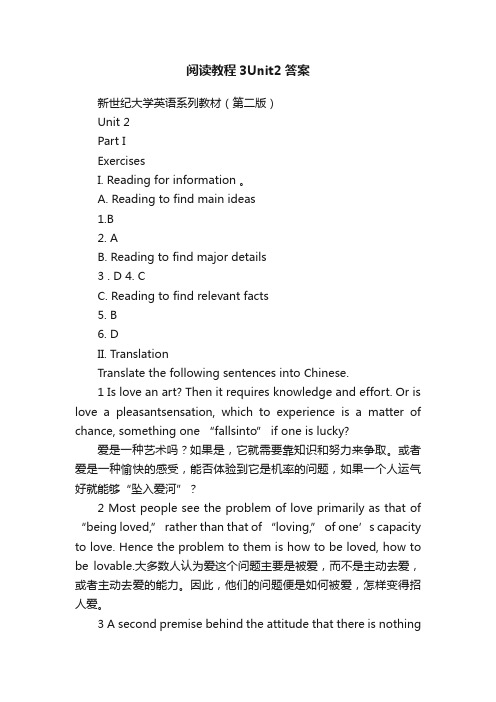
阅读教程3Unit2答案新世纪大学英语系列教材(第二版)Unit 2Part IExercisesI. Reading for information 。
A. Reading to find main ideas1.B2. AB. Reading to find major details3 . D 4. CC. Reading to find relevant facts5. B6. DII. TranslationTranslate the following sentences into Chinese.1 Is love an art? Then it requires knowledge and effort. Or is love a pleasantsensation, which to experience is a matter of chance, something one “fallsinto” if one is lucky?爱是一种艺术吗?如果是,它就需要靠知识和努力来争取。
或者爱是一种愉快的感受,能否体验到它是机率的问题,如果一个人运气好就能够“坠入爱河”?2 Most people see the problem of love primarily as that of “being loved,” rather than that of “loving,” of one’s capacity to love. Hence the problem to them is how to be loved, how to be lovable.大多数人认为爱这个问题主要是被爱,而不是主动去爱,或者主动去爱的能力。
因此,他们的问题便是如何被爱,怎样变得招人爱。
3 A second premise behind the attitude that there is nothingto be learnedabout love is the assumption that the problem of love is the problem of an“object,” not the problem of a “faculty.”关于爱没有什么可学,这一想法背后的第二个前提是一个假设,此假设认为爱的问题是对象的问题,而不是能力的问题。
新世纪阅读教程3 unit1-4课文翻译
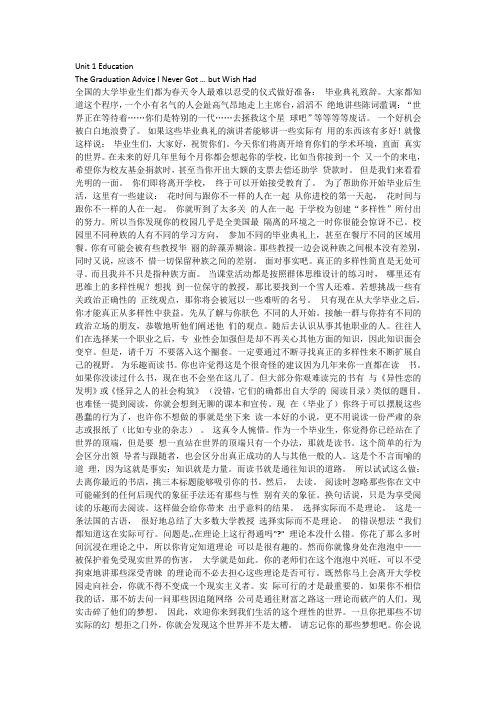
Unit 1 EducationThe Graduation Advice I Never Got … but Wish Had全国的大学毕业生们都为春天令人最难以忍受的仪式做好准备:毕业典礼致辞。
大家都知道这个程序,一个小有名气的人会趾高气昂地走上主席台,滔滔不绝地讲些陈词滥调:“世界正在等待着……你们是特别的一代……去拯救这个星球吧”等等等等废话。
一个好机会被白白地浪费了。
如果这些毕业典礼的演讲者能够讲一些实际有用的东西该有多好!就像这样说:毕业生们,大家好,祝贺你们。
今天你们将离开培育你们的学术环境,直面真实的世界。
在未来的好几年里每个月你都会想起你的学校,比如当你接到一个又一个的来电,希望你为校友基金捐款时,甚至当你开出大额的支票去偿还助学贷款时。
但是我们来看看光明的一面。
你们即将离开学校,终于可以开始接受教育了。
为了帮助你开始毕业后生活,这里有一些建议:花时间与跟你不一样的人在一起从你进校的第一天起,花时间与跟你不一样的人在一起。
你就听到了太多关的人在一起于学校为创建“多样性”所付出的努力。
所以当你发现你的校园几乎是全美国最隔离的环境之一时你很能会惊讶不已。
校园里不同种族的人有不同的学习方向,参加不同的毕业典礼上,甚至在餐厅不同的区域用餐。
你有可能会被有些教授华丽的辞藻弄糊涂。
那些教授一边会说种族之间根本没有差别,同时又说,应该不惜一切保留种族之间的差别。
面对事实吧。
真正的多样性简直是无处可寻。
而且我并不只是指种族方面。
当课堂活动都是按照群体思维设计的练习时,哪里还有思维上的多样性呢?想找到一位保守的教授,那比要找到一个雪人还难。
若想挑战一些有关政治正确性的正统观点,那你将会被冠以一些难听的名号。
只有现在从大学毕业之后,你才能真正从多样性中获益。
先从了解与你肤色不同的人开始。
接触一群与你持有不同的政治立场的朋友,恭敬地听他们阐述他们的观点。
随后去认识从事其他职业的人。
往往人们在选择某一个职业之后,专业性会加强但是却不再关心其他方面的知识,因此知识面会变窄。
新世纪大学英语3第三版课后答案
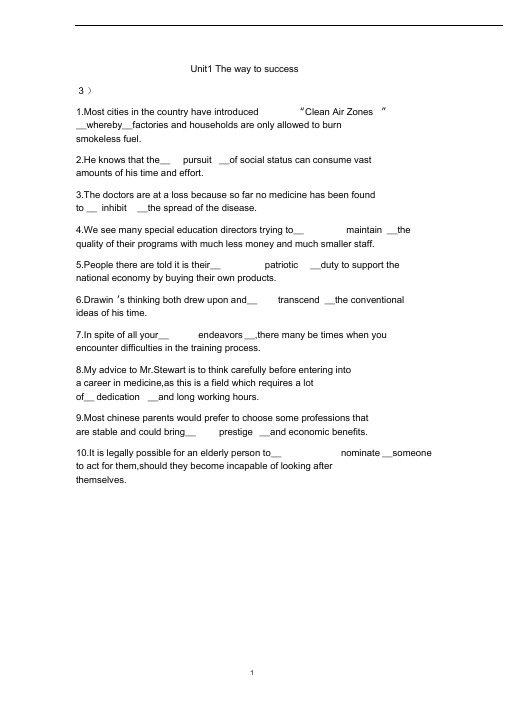
Unit1 The way to success3 )1.Most cities in the country have introduced “Clean Air Zones ”__whereby__factories and households are only allowed to burnsmokeless fuel.2.He knows that the__ pursuit __of social status can consume vastamounts of his time and effort.3.The doctors are at a loss because so far no medicine has been foundto __ inhibit __the spread of the disease.4.We see many special education directors trying to__ maintain __the quality of their programs with much less money and much smaller staff.5.People there are told it is their__ patriotic __duty to support the national economy by buying their own products.6.Drawin ’s thinking both drew upon and__ transcend __the conventional ideas of his time.7.In spite of all your__ endeavors __,there many be times when you encounter difficulties in the training process.8.My advice to Mr.Stewart is to think carefully before entering intoa career in medicine,as this is a field which requires a lotof__ dedication __and long working hours.9.Most chinese parents would prefer to choose some professions thatare stable and could bring__ prestige __and economic benefits.10.It is legally possible for an elderly person to__ nominate __someone to act for them,should they become incapable of looking afterthemselves.Unit2 Beat your fear3)11.Kids are more likely to__ intervene __in a situation if they believe their parents expect them to help.12.The first lesson I learned as a newcomer for the company was neverto__ underestimate __the degree of difficulty I could face in career advancement.13.Just as I started to think that I was never going to get well,theillness began to__ recede __.14.Whatever the decision is,I would like you to know that yourdepartment is my first choice and I__ deem__it a great honor if I could study in your department.15.During one particularly__ bleak __moment in my career,a senior colleague of mine said to me, “If you follow your dream,the moneywill come.Follow the money,and you will lose your dream. ”16.Unless we can find a way to__ appraise __nature and then invest in protecting it,our basic life-support systems are going to collapse.17.The blizzard moved south,turning into an icy rainthat__ paralyze __the airports for three days.18.In this introduction we have diagnosed some of the causes oftheillness and in the following chapters,we will draw attention to itsvarious unpleasant__ symptoms__.19.In those days,divorce under any circumstances was socially unacceptable and there was great__ dismay__in the family who went through it.20.Every time she talked about being rejected in her hunt for ajob,she seemed on the__ brink __of tears,and I would quickly switch the conversation to another topic.Unit3 Life stories3)21.As a number of authors point out,the urge to migrate isa(n)__ integral __part of human nature.22.Children should be allowed to__ cherish __those few years ofinnocence before they have to learn the truth about the real world.23.He has been__ afflicted __by a horrible disease,from which one of hisbest friends died two week ago.24.The results of the survey are__ noteworthy __and useful despite being from a small sample.25.The director said that they needed a young actress whocould__ portray __someone who was both unbalanced and confident at thesame time.26.praise must be used wisely to__ compliment __students who perform upto expections and to encourage students to perform to maximum levels.27.In the__ domain__of research,it is an accepted fact that scientificpublications have to be written or translated into English to getpublished,acknowledged,and cited.28.He received a(n)__ anonymous__call threatening to disclose detailsof his affair if he didn ’t pay the money.29.The movie presents Lincoln as a strong-willed,__ conscientious __man who led the US through a moral,constitutions and political crisis.30.It is understandable that the health and welfare of their familyis a(n)__ perpetual __concern for this young couple.Unit5 When work is a pleasure3)31.The general considered all the information that had been gatheredand__gauged__what possible moves the enemy might make before issuinghis orders.32.The new president said she would__ dedicate __herself to protectingthe rights of the old and the homeless,who are otherwise helpless and vulnerable.33.Cell phone conversations,which are fairly__ commonplace__on commuter trains,can be annoying to fellow commuters.34.Ask your doctor whether a low-fat diet and a daily walkwill__ suffice __to reduce your high blood pressure.35.The__ revenue __from tourism is the biggest single contribution toGDP in the Maldives;every year many tourist from all corners of theworld spend their holidays there.36.Since the beginning of this century,china has built many mordenconference centers with underground parking,air-conditioningand__simultaneous __translation systems.37.While advertising offers a stimulus to buy,sales promotion offersa(n)__ incentive __to buy,but consumers must have their own reason tobuy38.In general,smokers living in cities are slightly more__ prone __to lung cancer than smokers who are living in the country.39.A large proportion of important__ innovations __are brought about by people who step outside of conventional categories or traditionalassumptions.40.The habit of going to coffee houses was__ fostered __by the city ’s relatively small size,safe streets,good public transportation andmoderate climate.Unit8 The art of parenting3)41.He could hardly control his__ indignation __at the condition under which the miners where forced to work,without water and enough food.42.Both side were very careful when drafting the ceasefireagreements,they wanted to prevent any actions that could beconsidered__ provocative __by either side.43.She has always had a(n)__ militant __personality;she is always prepared and ready to do battle when she believes that the cause isright.44.News stories__ overlap __;morning paper headlines take account of the previous,evening ’s radio and TV stories,and the electronic media pick up items from the daily press.45.Lucy stretched up to kiss her dad ’s cheek lightly,and he patted his daughter as if he was__ conferring __an honor to her.46.Inspired by Martin Luther king ’s famous speech, “I Have a dream ”,thousand of people went out onto the streets to support thecivil rights,movement in__ defiance __of the curfew.47.Beth was__ hesitant __about visiting his ex-boy friend;she worriedthat he might refuse to talk to her.48.When human first traveled into outer space,it was as revolutionarya(n)__ milestone __in human culture as the invention of the wheel.49.Perplexed,she turned and noticed her husband had collapsed and was slumped on the floor behind the counter.she rushed to him and__cradled __his head in her arms.50.Health experts are now__ preaching __that even a littleexercise,such as doing housework or light gardening,is far betterthan none at all.Unit16)A committed( 犯罪) F eventually( 最后) K feats( 功勋)B scarcely( 几乎不) G premier( 首相) L diligent( 勤勉,刻苦)C dedication( 奉献) H endeavor( 尝试,尽力) M slightest( 纤弱,细瘦)D tragic( 悲惨的) I transcend( 超越,摆脱)N attained( 到达)E handicaps( 阻碍,) J bypass( 旁路小道) O diligently( 勤奋的)Where there is a will,there is a way.This proverb means that if youare really determined to do something however difficulty is mightbe,you will(1)__ eventually __find a way to do itwell.The(2)__ premier __point is that you must have the will to achieve success.Ninety percent of the failures that occur are due to the fact thatthere is no strong will involved.Many people simple say that theywant something,but they do not make any(3)__ endeavor __to achieveit.So,instead of getting it,they use the poorest excuse to explainthe situation away.On many occasions,people tend to(4)__ bypass__every minuteobstacle,making the objective impossible to attain.In reality,if theyhave the will to succeed,they can get rid of the(5)__ handicaps __and achieve their goalsOnly those with a(n)(6)__ committed __and focused will and spirit canfight their way to final victory.Many a famous man has the sameexperience.They have(7)__ attained __their prestige because they havehad the will to(8)__ transcend __apparently insuperable( 无法克服的)obstacles.many artists,statesmen,writers and inventors have managedto succeed because they possess a fierce will,which hashelped them to accomplish major(9)__ feats __Therefore,we can see that the main thing which one needs is a strongwill.Weak-willed people never climb to the top.They collapse atthe(10)__ slightest __use of force against them.Strong-willed people,onthe other hand,will stand up against all odds and will make it apoint to succeed.6)A excessive( 过度) F pathetic( 可怜的) K characterized( 性格)B roles( 规则) G challenge( 挑战) L awareness( 意识,认识)C paralyze( 使瘫痪) H amount( 总计) M catastrophe( 不利局面) Daspects( 方面) I exposed( 暴露) N reaction( 回应)E deemed(认为) J recede( 减小) O vicious( 凶险的)Social anxiety symptoms often begin during adolescence.It ’s developmental process that is(1)__ characterized __by profound psychological changes,especially in terms of how we relate toothers.One of the most frustrating(2)__ aspects __of the adolescentyears is the tendency for self-focus and a decrease in the(3)__ amount__of focus we have for the feelings and needs of othersWhile these change are fairly universal,those of us who were bornwith a shy temperament( 性格)can carry the adolescent fears,which maynever(4)__ recede __,into adulthood.An anxious temperament causes ourbrains to react forcibly when(5)__ exposed__to the stress of sudden awareness of our peers and gradually we become more and morevulnerable.Our brains label the fear of exposure or embarrassment as highly dangerous.This may result in a(n)(6)__ vicious __circle for manyyears:excessive self-consciousness and inhibition when we feel we are being observed.To cope with the problem,I would like to(7)__ challenge __you to strive for increased focus other people,in place ofyour(8)__ excessive __focus on yourself.Yes,I know,this is easier saidthan done.The fear may cause you to feel that you will lose controlor make a fool of yourself when you are in the spotlight( 聚光灯).But if you begin to build a new response,in(9)__ reaction __to yourfears,you will gradually build up a strong and more positiveresponse.Remember,don’t let self-consciousness(10)__ paralyze __you!Be courageous!6)A diplomatic( 外交的) F popularity( 欢迎) K devote( 投票)B humanitarian( 人道主义) G beneficiary( 利益) L mentally( 精神上) Cdomain(领域) H committed( 忠诚,坚定) M originally( 原始的)D integral( 必须的) I define( 规定) N surviving( 存在的)E embarked( 从事,着手) J humane( 仁慈,高尚) O cherishing( 钟爱) Audrey Hepburn was a beautiful actress and model,who become one ofthe most successful and well-known actresses in the film(1)__ domain__She was a fashion icon and role model for women all over theworld,helping to(2)__ define __a particular type offresh,vulnerable,elfin( 小精灵似的)beauty.Today ’s(3)__ popularity __of the slim fashion model is due to Audrey Hepburn ’s influence.Although she appeared frail( 脆弱的),she was(4)__ mentally __strong.At the end ofthe acting career when she entered a(n)(5)__ diplomatic __career as a Goodwell Ambassador for UNICEF,she was so solidly(6)__ committed __to her cause that she was held in highest esteem( 尊重)by even the most hardended politicians.Audrey originally started working for UNICEF in 1954,doing radiopresentations.She always said it was happy to(7)__ devote __her life to helping impoverished( 穷困的)children after her own good fortunein(8)__ surviving __the hardship of the Nazi occupation of Holland.shebegan her permanent ambassadorship in 1988 and(9)__ embarked__on tripsto many countries.She was always positive :“people in these places don’t know Audery Hepburn,but they recognize the name UNICEF.whenthey see UNICEF their face light up,because they know that somethingis happening. ”In 1992,her(10)__ humanitarian __work with those in need was recognize when she was awarded the Jean Hersholt HumanitarianAward by the Academy of Motion Picture Arts and Sciences for hercontribution to humanity.6)A coincide( 相符) F notion( 概念,意见) K reflects( 表达,反射) Bdiversion( 转移,) G adverse( 不利,有害) L primary( 首要的)Cfoster( 培养,促进) H motivations( 动力) M miserable( 悲惨,令人痛苦) D gauging( 测定,) I monetary( 货币,金钱) N aspects( 方面) Egossiping( 八卦,) J livelihood( 生活,生计) O employees( 雇员)In a study conducted in the UK,it was found that only four out ofevery five(1)__ employees__happy at work.Surprisingly,contrary topopular(2)__ notion __,friendly,supportive colleague and a goodmanage,instead of the salary or the love for the work,have been foundto be the(3)__ primary __causes of happiness at work.So,how do you keep your spirits up and at the same time,(4)__ foster __a sense of joy onthe job? Here is one of the trips to help you on your way to findinghappiness and complete job satisfaction in the workplace.Start with a positive outlook.Happiness is a state of mind;it(5)__ reflects __an attitude,though not many people realize it.Stayinghappy at work is totally base on your(6)__ motivations __on a positive outlook toward your job,not on(7)__ monetary __rewards or materialgain.Dwelling on( 老是想着)the good(8)__ aspects __of the work ratherthan rattling on and on( 对, 喋喋不休)about what makes you unhappy is the basic key to happiness.Negativity and(9)__ gossiping __about bad things may be easy,but it is looking at the bright side that makesfor the challenging part of a job.As Francesca Reigler puts it,“Happiness in an attitude.We either makeourselves(10)__ miserable __,or happy and strong.The amount of work isthe same. ”6)A contact( 接触) F hardy( 鲁莽,勇敢) K handy( 方便)B obedience( 服从,) G confer( 授予) L charge( 装载)C presumption( 推测) H bounce( 反弹) M dispense( 摒弃, 不用做)D intellect( 才智) I cradle( 轻拥) N disposal( 丢掉,清除)E tumble( 摔倒,翻腾) J automatic( 自动的) O attached( 附加,依恋) Laughter is a(n)(1)__ automatic __response to being touched by atickle( 瘙痒)-a natural response from the child.This puts the ticklerin(2)__ charge __of how much or how long the child laughs.We adultsdon’t read children ’s minds,but we often havea(n)(3)__ presumption_ _that we can.So we usually think we ’re aware of what’s too much tickling and when to stop.But it is possible to trapour children without knowing it.We parents become(4)_ _attached __to tickling because it seems to be a(n)(5)_ _handy__shortcut tolaughter.We wish that our children are happy and love us,and ticklingbecomes our shortcut to get assured.Rather than forcing laughter in this way,we can(6)__ confer __upon them inner confidence if we will get known on the floor and invite them tobe in playful physical(7)__ contact_ _with us.If we find ways to givethem much of the power,our children will laugh and laugh.Games like“I have a hundred hugs for you ”or“Where’s Jared? I know hisaround here somewhere ”or “Oh no! I can ’t get this horsy rider offmy back! ”let children laugh and laugh as we try to catch them,or tryto find them,or try to(8)__ bounce__them, off our backs,and fail overand over.The physical contact that requires more creativity than ticklingallows us to (9)__ tumble __around,to press our heads against theirstomachs here and there for a second,and to manage an embrace beforethey make another daring escape.We get our affection across withouttrapping our children.And we give them a chance to be inventive asthey use their(10)_ _intellect __to figure out a hundred ways tooutsmart us.51.如今,很多年轻人不再选择" 稳定"的工作,他们更愿意自主创业,依靠自己的智慧和奋斗去实现自我价值。
新世纪大学英语教材综合教程第3本-unit-1-答案
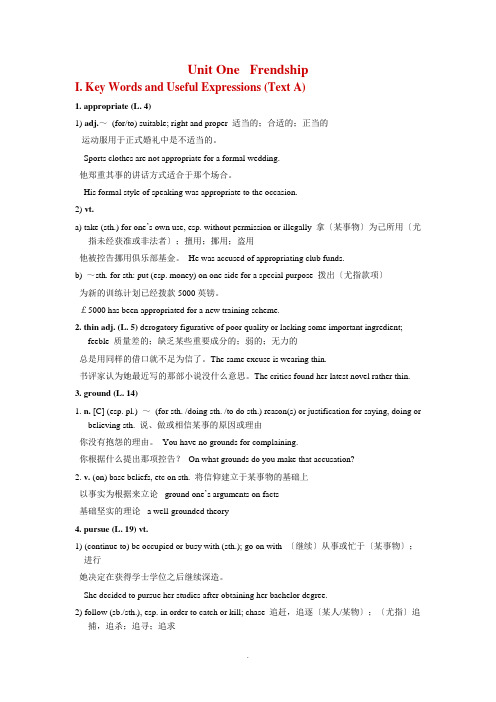
Unit One FrendshipI. Key Words and Useful Expressions (Text A)1. appropriate (L. 4)1) adj.~(for/to) suitable; right and proper 适当的;合适的;正当的运动服用于正式婚礼中是不适当的。
Sports clothes are not appropriate for a formal wedding.他郑重其事的讲话方式适合于那个场合。
His formal style of speaking was appropriate to the occasion.2) vt.a) take (sth.) for one’s own use, esp. without permission or illegally 拿〔某事物〕为己所用〔尤指未经获准或非法者〕;擅用;挪用;盗用他被控告挪用俱乐部基金。
He was accused of appropriating club funds.b) ~sth. for sth: put (esp. money) on one side for a special purpose 拨出〔尤指款项〕为新的训练计划已经拨款5000英镑。
£5000 has been appropriated for a new training scheme.2. thin adj. (L. 5) derogatory figurative of poor quality or lacking some important ingredient;feeble 质量差的;缺乏某些重要成分的;弱的;无力的总是用同样的借口就不足为信了。
The same excuse is wearing thin.书评家认为她最近写的那部小说没什么意思。
The critics found her latest novel rather thin. 3. ground (L. 14)1. n. [C] (esp. pl.) ~(for sth. /doing sth. /to do sth.) reason(s) or justification for saying, doing orbelieving sth. 说、做或相信某事的原因或理由你没有抱怨的理由。
新世纪大学英语系列教材阅读教程第三册练习答案
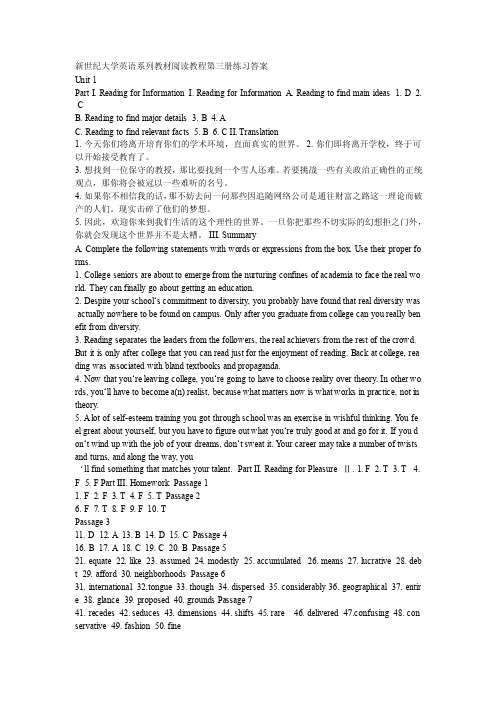
新世纪大学英语系列教材阅读教程第三册练习答案Unit 1Part I. Reading for Information I. Reading for Information A. Reading to find main ideas 1. D 2.CB. Reading to find major details 3. B 4. AC. Reading to find relevant facts 5. B 6. C II. Translation1. 今天你们将离开培育你们的学术环境,直面真实的世界。
2. 你们即将离开学校,终于可以开始接受教育了。
3. 想找到一位保守的教授,那比要找到一个雪人还难。
若要挑战一些有关政治正确性的正统观点,那你将会被冠以一些难听的名号。
4. 如果你不相信我的话,那不妨去问一问那些因追随网络公司是通往财富之路这一理论而破产的人们。
现实击碎了他们的梦想。
5. 因此,欢迎你来到我们生活的这个理性的世界。
一旦你把那些不切实际的幻想拒之门外,你就会发现这个世界并不是太糟。
III. SummaryA. Complete the following statements with words or expressions from the box. Use their proper fo rms.1. College seniors are about to emerge from the nurturing confines of academia to face the real wo rld. They can finally go about getting an education.2. Despite your school‘s commitment to diversity, you probably have found that real diversity was actually nowhere to be found on campus. Only after you graduate from college can you really ben efit from diversity.3. Reading separates the leaders from the followers, the real achievers from the rest of the crowd. But it is only after college that you can read just for the enjoyment of reading. Back at college, rea ding was associated with bland textbooks and propaganda.4. Now that you‘re leaving college, you‘re going to have to choose reality over theory. In other wo rds, you‘ll have to become a(n) realist, because what matters now is what works in practice, not in theory.5. A lot of self-esteem training you got through school was an exercise in wishful thinking. Y ou fe el great about yourself, but you have to figure out what you‘re truly good at and go for it. If you d on‘t wind up with the job of your dreams, don‘t sweat it. Y our career may take a number of twists and turns, and along the way, you‘ll find something that matches your talent. Part II. Reading for Pleasure Ⅱ. 1. F 2. T 3. T 4.F 5. F Part III. Homework Passage 11. F2. F3. T4. F5. T Passage 26. F7. T8. F9. F 10. TPassage 311. D 12. A 13. B 14. D 15. C Passage 416. B 17. A 18. C 19. C 20. B Passage 521. equate 22. like 23. assumed 24. modestly 25. accumulated 26. means 27. lucrative 28. deb t 29. afford 30. neighborhoods Passage 631. international 32.tongue 33. though 34. dispersed 35. considerably 36. geographical 37. entire 38. glance 39. proposed 40. grounds Passage 741. recedes 42. seduces 43. dimensions 44. shifts 45. rare 46. delivered 47.confusing 48. con servative 49. fashion 50. fineUnit 2Part I. Reading for Information I. Reading for Information A. Reading to find main ideas 1. B 2.AB. Reading to find major details 3. D 4. CC. Reading to find relevant facts 5. B 6. D II. Translation爱是再简单不过的事,这一观点至今仍然十分盛行,尽管大量事实都对此予以否定。
阅读教程 3 Unit 4答案
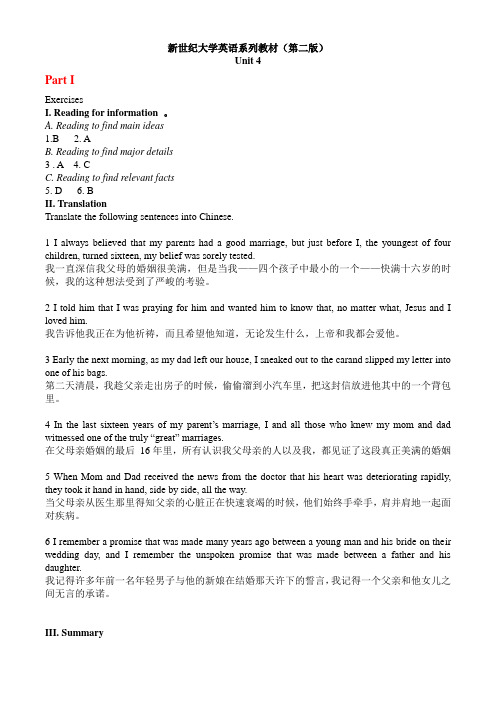
新世纪大学英语系列教材(第二版)Unit 4Part IExercisesI. Reading for information 。
A. Reading to find main ideas1.B2. AB. Reading to find major details3 . A 4. CC. Reading to find relevant facts5. D6. BII. TranslationTranslate the following sentences into Chinese.1 I always believed that my parents had a good marriage, but just before I, the youngest of four children, turned sixteen, my belief was sorely tested.我一直深信我父母的婚姻很美满,但是当我——四个孩子中最小的一个——快满十六岁的时候,我的这种想法受到了严峻的考验。
2 I told him that I was praying for him and wanted him to know that, no matter what, Jesus and I loved him.我告诉他我正在为他祈祷,而且希望他知道,无论发生什么,上帝和我都会爱他。
3 Early the next morning, as my dad left our house, I sneaked out to the carand slipped my letter into one of his bags.第二天清晨,我趁父亲走出房子的时候,偷偷溜到小汽车里,把这封信放进他其中的一个背包里。
4 In the last sixteen years of my parent’s marriage, I and all those who knew my mom and dad witnessed one of the truly “great” marriages.在父母亲婚姻的最后16年里,所有认识我父母亲的人以及我,都见证了这段真正美满的婚姻5 When Mom and Dad received the news from the doctor that his heart was deteriorating rapidly, they took it hand in hand, side by side, all the way.当父母亲从医生那里得知父亲的心脏正在快速衰竭的时候,他们始终手牵手,肩并肩地一起面对疾病。
新世纪大学英语综合教程3课后习题答案完整版UNIT
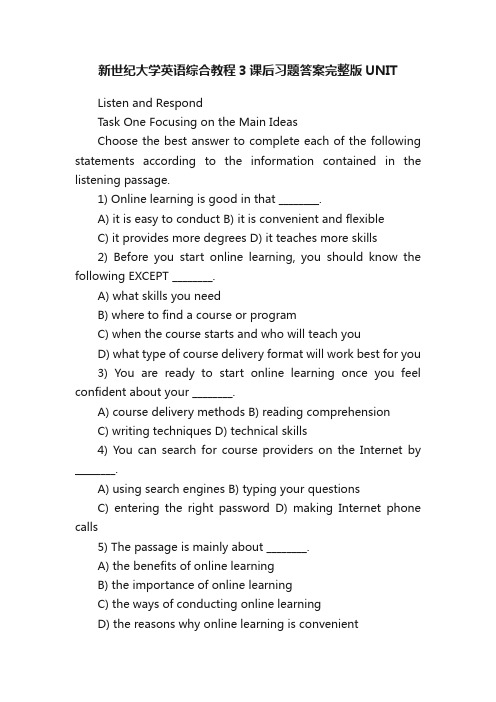
新世纪大学英语综合教程3课后习题答案完整版UNITListen and RespondTask One Focusing on the Main IdeasChoose the best answer to complete each of the following statements according to the information contained in the listening passage.1) Online learning is good in that ________.A) it is easy to conduct B) it is convenient and flexibleC) it provides more degrees D) it teaches more skills2) Before you start online learning, you should know the following EXCEPT ________.A) what skills you needB) where to find a course or programC) when the course starts and who will teach youD) what type of course delivery format will work best for you3) You are ready to start online learning once you feel confident about your ________.A) course delivery methods B) reading comprehensionC) writing techniques D) technical skills4) You can search for course providers on the Internet by ________.A) using search engines B) typing your questionsC) entering the right password D) making Internet phone calls5) The passage is mainly about ________.A) the benefits of online learningB) the importance of online learningC) the ways of conducting online learningD) the reasons why online learning is convenientTask Two Zooming In on the DetailsListen to the recording again and fill in the blanks according to what you have heard.1) Online learning is a new way to earn your degree or master new skills .2) You must have the basic computer skills. At the very minimum , you should be able to send and receive email comfortably, search the Internet, and type reasonably fast and accurately .3) Perhaps the best way to find the right online course format is to consider your education needs and learning style .4) Type into the search engines the key words and you can easily get what you want. Before you know it, your fingers will be flying and your online learning adventure will have begun.Read and ExploreTask One Discovering the Main Ideas1 Answer the following questions with the information contained in Text A.1) What disaster did the author encounter earlier in his career?He encountered a student who challenged the curriculum which required a pharmacy student to study literature.2) What are the differences between the certificate that reads Qualified Pill-Grinding Technician and the one that reads Bachelor of Science? The former means that the graduate has completed the training of professional skills in pharmacy while the latter, besides professional training, also involves education in the ideas mankind has generated within its history.3) How did the author communicate the significance of studying the literal arts in college to the pharmacy student?He explained to the student that the time of a person’s lifecould be divided into three parts: one is for sleep, the second is for work which involves professional skills, and the third part is for life after work in which education in liberal arts —philosophy, arts, music, literature, history, etc. — plays a vital part.4) What is the business of college education according to the author? The business of college education is not merely to train students, but to civilize them with the best human thoughts in history. In other words the author draws a clear distinction between training and education. The former provides one with skills for a job or career while the latter enables one to become a civilized person by coming into contact with the best minds in history.5) How can a person become civilized according to the text?A person has to enter the past and familiarize himself/herself with both the technical and spiritual resources created by mankind, so that he/she could become civilized and play his/her role in civilization.6) What does the author think of the mission undertaken by the faculties of a university? How can they accomplish this mission?The faculties of liberal arts colleges as well as of specialized schools are entrusted with the mission to put students in close contact with the best human minds in history. They should turn themselves into some sort of storehouse of human experience and try their best to communicate that experience to their students, so that their students will become civilized humans instead of savages who only know how to operate machines or push buttons.2 Text A can be divided into three parts with the paragraph number(s) of each part provided as follows. Write down the mainidea of each part. Part Paragraph(s) Main IdeaOne 1–7 In response to the challenge posed by a particular student who merely intends to pursue skills at college and takes no interest in literature, the author draws a distinction between professional training and college education. The former can only provide students with professional skills while the latter enables students to become civilized humans. Hence the importance of liberal arts education at college.Two 8–10 College education must enable students to come into contact with the best minds in history, so that they can become civilized and useful human beings instead of new species of savages who only know how to operate machines or push buttons. Three 11 College education must target at enabling students to become both specialists and civilized humans. All college teachers must make themselves some sort of storehouse of human experience and try their best to communicate that experience to their students.Task Two Reading Between the LinesRead the following sentences carefully and discuss in pairs what the author intends to say by the italicised parts.1) Will there be a book in the house? Will there be a paintinga reasonably sensitive man can look at without shuddering? (Para.5)Do you have a cultivated mind to know what books your family should read? And do you know what kind of paintings you should put up on the wall that would not offend a cultured eye?2) “I hope you make a lot of it,” I told him, “because you’re going to be badly stuck for something to do when you’re not signing checks.” (Para. 7)I hope you will make a lot of money, but I’m sure you’ll beat a loss what to do when you are not signing checks. In other words, you can have a lot of money, but you may not live a meaningful and fulfilling life.3) You are on the way to being new species of mechanized savage, the Pushbutton Neanderthal. (Para. 8)Not getting in touch with what the best human minds have thought, you are going to be uncivilized humans or a new type of savages who can only operate machines by pushing buttons.4) Our colleges inevitably graduate a number of such life forms, but it cannot be said that they went to college; rather, the college went through them — without making contact. (Para. 8)A number of our college graduates have indeed turned out to be “new species of mechanized savage”. This only means that they have not received a college education though they have spent some time there, for they have failed to make contact with the best human minds in history.5) If you are too much in a hurry, or too arrogantly proud of your own limitations, to accept as a gift to your humanity some pieces of the minds of Sophocles, of Aristotle, of Chaucer — and right down the scale and down the ages to Yeats, Einstein, . White, and Ogden Nash —then you may be protected by the laws governing manslaughter, and you may be a voting entity, but you are neither a developed human being nor a useful citizen of a democracy. (Para. 10)Even if you are too busy or feel complacent and, therefore, refuse to come into contact with the best human minds within history, you can still be protected by law and enjoy the right to democratic voting. But you can never be considered as an educated, civilized person; nor can you be accepted by society as a useful citizen in a democratic nation.Checking Your VocabularyWord Detective1 Put down the right word from Text B in the space provided according to the given definition. The first letter of each word is already given. Example:g lobal: of or concerning the whole world1) c ombine: join together; unite2) i mplement: carry out or put into practice3) i llusion: a false idea, esp. about oneself4) i ndispensable: too important or too useful to be without5) i ntelligence: (good) ability to learn, reason, and understand6) e mphasis: special force or attention given to sth. to show that it is particularly important7) r econcile: find agreement between (two ideas, situations, etc., that seem to be in opposition)8) n egotiate: talk with another person or group in order to try to come to an agreement or settle an argument2 Fill in each blank with a word or phrase from Text B. Both the explanation and the number of the paragraph in which the target word or phrase appears are given in brackets. Be sure to use the proper form.Example: The whole region is crying out for rain —it has been dry for three months.(be in great need of; demand urgently: Para. 2)1) There was a big surprise in store for Paul when he got to his office: he got promoted!(about to happen: Para. 1)2) He wants to buy a DVD player, and has been saving money to this end for these two months.(to help achieve this aim or purpose: Para. 2)3) His grandma died last month. And in accordance with her will (遗嘱), she was buried in France.(in a way that fulfils or agrees with: Para. 2)4) The details of this programme are dealt with in depth elsewhere in this book.(done with great thoroughness: Para. 5)5) Before this road was built, the only access to the village was by boat. (means or right of using, reaching, or obtaining: Para.8)6) Don’t worry about your son’s shyness; it’s just a phase he’s going through.(a stage of development: Para. 10)Checking Your Comprehension1 Answer the following questions with the information contained in Text B.1) On what should the role of education be based in the 21st century? The role of education in the 21st century should be based on the hope for a world that is a better place to live in.2) What are some of the problems in the 21st century that humankind should overcome in order to make the world a better place to live in?We have to overcome the tensions between the global and the local, between tradition and modernity, between long-term and short-term considerations, between the need for competition and the concern for equality of opportunity and between the spiritual and the material so as to make the world a better place to live in.3) In what way can we learn to live together?We can learn to live together by understanding others and their history, traditions and spiritual values, implementingcommon projects and managing the inevitable conflicts in an intelligent and peaceful way.4) Is the idea of being a multi-subject specialist feasible? Why or why not?No. Because there are so many different types of knowledge; any attempt to know everything would be an illusion.5) What’s the fundamental function of general education?General education provides the passport to lifelong education. It enables people to learn other languages and become familiar with other subjects. It also arouses people’s interest in learning and thus lays the foundation for lifelong education.6) Besides learning to do a job in industrial economies, what other competence do people need to acquire?People also need to acquire the competence to cope with various situations and cooperate with others in teams.7) How can pupils and students acquire the competence to work in teams? T o develop team skills, students should be provided with opportunities to involve themselves in work experience while they are still in education.8) What is the aim of “learning to be”? How can the aim be achieved? The aim of “learning to be” is the compl ete fulfillment of man. All people should receive an education that would equip them to develop an independent, critical way of thinking and exercising judgment.9) As far as education is concerned, what society should we build in the 21st century?We should build a learning society based on the acquisition, renewal and use of knowledge.2 Read the following sentences carefully and discuss in pairswhat the author intends to say in the following sentences.1) This is precisely the case where education policies are concerned. (Para. 2)The solution to any serious problem involves much consideration, cooperation and negotiation. It is exactly the same with educational policies, which can only be worked out through lots of discussions and negotiations.2) Since knowledge is of multiple nature, any attempt to know everything becomes more and more pointless. (Para. 5) There are so many different kinds of knowledge that it is increasingly meaningless and impossible to train students into specialists in all fields.3) The future of industrial economies hinges on their ability to turn advances in knowledge into innovations that will generate new businesses and new jobs. (Para. 6)The future of industrial economies depends critically on their ability to turn the development in knowledge into creative ideas, new methods or inventions. With creativity, new businesses and new jobs will be created.4) None of the talents which are hidden like buried treasure in every person must be left untapped. (Para. 7)The education one receives, which begins at birth and continues all through one’s life, should help develop and put into full play one’s potentials and talents.Enhance Your Language AwarenessWords in ActionWorking with Words and Expressions1 In the boxes below are some of the words you have learned in this unit. Complete the following sentences with them. Change the form where necessary.Text A peculiar preside rear specialize sufficeText B associate combine emphasis illusion implement indispensable negotiate phase reconcile1) I often associate summer with holidays. How I wish I could be on vacation next summer!2) In college his major was biology, but now he specializes in the sale of computers.3) Prejudice combined with ignorance destroys the hopes of many AIDS sufferers.4) I think we should put as much emphasis on preventing diseases as we do on curing them.5) The budget of the company scarcely suffices to pay the employees, let alone buy any new equipment.6) The new heating system is in the trial phase of its operation; it’s due to be put into full operation next winter.7) Having presided over the company for 30 years, he has witnessed all its ups and downs.8) He has his own peculiar style of solving problems which you’ll soon get used to.9) Now that both Julie and her husband have lost their jobs, how will they rear their sons and daughters?10) The government says it will not negotiate with the terrorists; on the contrary it will fight back.11) This guidebook is indispensable for travelers in this remote area of the country; they can’t go without it.12) He finally realized that his idea of learning to read and write in English well in three months was just an illusion .13) The committee’s suggestions sound reasonable, y et whether they can be implemented remains a problem.14) Workers usually demand high wages while the bossalways seeks high profits —it’s almost impossible to reconcile these two aims.2 In the boxes below are some of the expressions you have learned in this unit. Do you know how to use them in the proper context? Now check for yourself by doing the blank-filling exercise. Change the form where necessary.Text A average out have no business (doing) in essence see to it that stay out ofText B bring ab out call for cr y out for get … out of in accordance with in store lend itself to to this end try out1) This is just our family matter. You’d better stay out of it.2) We should try out all the tools before we can decide which best serves our purpose.3) What does the future hold in store for kids who quit school at an early age?4) Some novels quite readily lend themselves to adaptation (改编) as plays; others do not.5) Instead of comforting her, what you said, in essence made her feel even worse.6) He did not act in accordance with the orders that were given him; that’s why he was fired.7) The authorities are crying out for a thorough investigation into the coal-mine that blasted (爆炸) yesterday.8) See to it that everyone in your class knows that the party has been put off until next week.9) This is the storehouse of our company and customers have no business entering it.10) He’s the kind of person who often wonders what he can get out of others instead of what he can give to others.11) He wanted science students to take an interest in the arts,and to this end he offered literature classes at home on Sunday afternoons.12) Absent-mindedness is not at all allowed while you’re working. It’s the sort of work that calls for a high level of concentration.13) Science, especially computer science, has brought about changes in many aspects of our lives, such as the way we work, study and communicate.14) The expenses for the summer camp averaged out to 194 dollars per day, much more expensive than we had planned.Increasing Your Word Power1 Study the following pairs of words which are similar in meaning. Reflect on the differences in usage between the words in each pair and fill in each blank with an appropriate one. Change the form where necessary. enroll, participate1) How many countries will be participating in the Olympic Games?2) Barbara wanted her daughter to enroll in the ballet class while she herself registered for the drawing class.certify, prove3) The task proved to be more difficult than we’d thought.4) She felt quite relieved after reading the report of her physical checkup, which certified that she was in good health.expose, reveal5) The doctor did not reveal to him the truth that he had lung cancer.6) Silver will darken if it is exposed to sunlight for a period of time.assume, think7) We must assume him to be innocent until he is provedguilty.8) Do you think I would do something so stupid at my age?preside, host9) Which country is going to host the next World Cup?10) Mr. Finch retired after presiding over the company for 30 years.shudder, shake11) He shook the carpet to get rid of the dust.12) She shuddered at the thought that she could have been killed.negotiate, reconcile13) British Airways is negotiating a new contract with our company.14) Management and labor are attempting to reconcile their differences.diversity, distinction15) There is a need for greater diversity and flexibility in the training program.16) There’s a clear distinction between the dialects spoken in the two regions.illusion, imagination17) I can never make up stories —I have absolutely no imagination .18) I had been under the illusion that he loved me until I was told yesterday that he had just got married.scheme, plan19) The training scheme for the unemployed young people is aimed at helping them to find work.20) We don’t have any plan for the weekend, so we can join you for lunch on Saturday.2 The prefixes radio(-) and tele- are used to form new words, as is shown in the following table.radio(-)1) connected with radio waves or broadcasting 无线电波的;无线电广播的.radio-controlled a. 无线电控制的radio frequency n. 无线电频率radio communication n. 无线电通信radiocast = radiobroadcast n./vt.(用)无线电广播2) concerning radioactivity 与放射线有关的.radio-protective a. 防辐射的radioactive a. 放射性的radiodiagnosis n. 放射诊断,X线诊断radioelement n. 放射性元素radiography n. 射线照相(术)tele-1) at or over a long distance 远(距离).telescope n. 望远镜telecommunications n. 电信,长途通信teleshopping n. 电话购货法teleconference n. 远程会议;电信会议telecontrol 遥控2) by or for television 由(为)电视.teleplay n. 电视剧teletext n. 图文电视telecast vt. 电视广播3) done using a telephone 通过电话的.telesales = telemarketing n. 电话销售telephone tapping n. 电话窃听teleprinter n. 电传打印机Now fill in the blanks in the following sentences using the words in the above table. Change the forms where necessary.1) On clear nights, we observe stars by using telescopes .2) The event will be telecast simultaneously to nearly 100 countries.3) Telemarketing is becoming less popular now because more people prefer on-line shopping.。
世纪大学英语读写教程第三册后答案
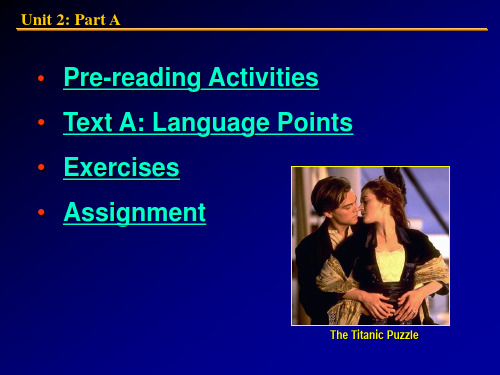
Language Points
9 Children are entitled to special consideration for two reasons: helplessness and innocence. They have not yet acquired either the faculty of reason or the wisdom of experience. Consequently, they are defenseless (incapable of fending for themselves) and blameless (incapable of real sin). That's why we grant them special protection. In an emergency, it is our duty to save them first because they, helpless, have put their lives in our hands. And in wartime, they are supposed to be protected by special immunity because they can have threatened or offended no one.
Language Points
3 But is not grouping women with children a raging anachronism? Should not any self-respecting modern person, let alone feminist, object to it as insulting to women? 4 Yet its usage is as common today as it was in 1912. Consider these examples taken almost at random from recent newspapers: 5 “The invaders gunned down the Indians, most of them women and children ...” 6 “As many as 200 civilians, most of them women and children, were killed ...”
新世纪大学英语综合教程3课后答案Unit4
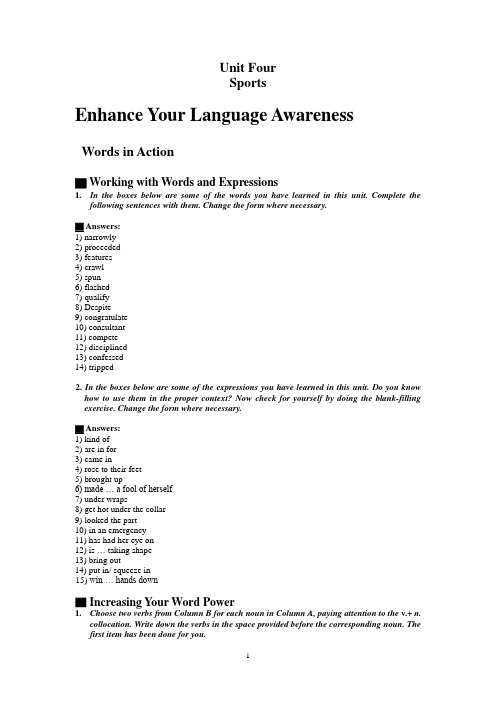
Unit FourSportsEnhance Your Language AwarenessWords in Action▇ Working with Words and Expressions1.In the boxes below are some of the words you have learned in this unit. Complete thefollowing sentences with them. Change the form where necessary.▇ Answers:1) narrowly2) proceeded3) features4) crawl5) spun6) flashed7) qualify8) Despite9) congratulate10) consultant11) compete12) disciplined13) confessed14) tripped2. In the boxes below are some of the expressions you have learned in this unit. Do you knowhow to use them in the proper context? Now check for yourself by doing the blank-filling exercise. Change the form where necessary.▇ Answers:1) kind of2) are in for3) came in4) rose to their feet5) brought up6) made … a fool of herself7) under wraps8) get hot under the collar9) looked the part10) in an emergency11) has had her eye on12) is … taking shape13) bring out14) put in/ squeeze in15) win … hands down▇Increasing Y our Word Power1.Choose two verbs from Column B for each noun in Column A, paying attention to the v.+ n.collocation. Write down the verbs in the space provided before the corresponding noun. The first item has been done for you.▆ Answers:Column A Column B1)break / set the record applaud form2)embody / represent an idea award hold3)award / win a medal break host4)hold/ host the Olympic Games congratulate reach5)applaud / congratulate an Olympic champion cross represent6) form/ forge a friendship embody set7) cross/ reach the finish line forge winNow fill in each blank in the following sentences with a verb in Column B. Change the verb form where necessary.▆ Answers:1)applaud2)embodies/represents3)forged/formed4)congratulated5)broken6)awarded7)crossed/reached8)host2. The suffix “–cy” can be added to some adjecti ves, nouns or verbs to form nouns, meaning “the state or quality of…”, or “the status or position of…”. Now form new words after the example and give their meanings in Chinese. Consult a dictionary if necessary.▇Answers:1) accurate →accuracy 精确,准确(度)2) adequate →adequacy 适当;充分3) consistent →consistency 一致性;连贯性4) delicate →delicacy 细致;精致5) efficient →efficiency 效能,效率6) intimate →intimacy 亲密,密切7) president →presidency 总统等的职位8) private →privacy 隐私;独处9) secret →secrecy 保密;保密能力10) self-sufficient →self-sufficiency 自给自足Now fill in the blanks in the following sentences by choosing the proper words you have just formed.▇Answers:1) secrecy2) presidency3) consistency4) efficiency5) privacy6) intimacy7) accuracy8) self-sufficiency9) adequacy10) delicacyGrammar in Context1.Study the following sentences, each of which contains either an “appositive phrase” or an“appositive clause”, and then do the following task.Now translate the following sentences into English, using either an “appositive phrase” or an “appositive clause” .▇Answers for reference:1) Football, his only hobby in life, has brought him many friends.2) The President of the company, Mrs Jones, held a press conference after the board meeting.3) The question whether to confess or not has been troubling little Tom.4) You should not have any doubt about the fact that the criminal has been arrested.5) The news was immediately spread far and wide that Beijing had won the bid for the 2008 Olympic Games.2.Study the following sentences from this unit, paying special attention to the constructions“not… but…” and “not only/simply…but (also)…”, and then do the following task.Now answer the questions with the help of the hints given in brackets, using the constructions “not… but…” and “not only/simply…but (also)…”.▇Answers for reference:1) No, he didn’t come to help, but to hinder us.2) It is not the players, but the supporters that are responsible for football hooliganism.3) No, their intent is not to catch all speeders but to catch enough to give them a warning.4) I’m not only willing, but (also) eager to join the volunteer team for the World Cup.5) No. He translates into English not only from French, but (also) from Polish.6) Because its appeal lies not only in its story but also in the ethical issues it raises.Cloze▆ Complete the following passage with words chosen from Text A. The initial letter of each is given.▇Answers:(1) disciplined(2) having … eye … on(3) hands down(4) in for(5) hitting(6) under wraps(7) add…support to(8) hot under the collar(9) fouling(10) tremendously(11) reassured(12) qualify(13) formed/forged(14) breakingTranslation1.Translate the following sentences into English, using the words and expressions given inbrackets.▇Answers for reference:1)The gasoline price is now at an all-time high, which has brought about wide public concern.2)He found that fish and rice feature the Japanese diet, and he then proceeded to write a reporton Japanese cooking culture.3)The spectators expected me to come in first but they were in for a shock. With a tumble, mychances for a gold medal in figure skating evaporated.4)He was a beggar but he didn’t look the part at all, because he was clean-shaven, wearingglasses and a brand-new suit.5)Having tripped over another athlete’s foot, he fell down on the track, but soon rose to hisfeet and limped to the finish line.6)On such a grand occasion I didn’t want to make a fool of myself, so I decided to take thechallenge and compete against that youngster.2. Translate the following paragraph into English, using the words and expressions in the box below.▇Answers for reference:A gold medal is a tribute to the athletic talent, determination and courage of an Olympic champion. Then how do the athletes make themselves fortunate enough to be so highly honored? The champions who have mounted the winners’ stand can offer an answer based on their own experiences. First, in the course of training, they visualize themselves as champions. Once their dreams of becoming champions take shape, they will cling to them courageously. What’s more, top performers are driven to bring out their best. They discipline themselves and s queeze in every possible minute to practice every day. Despite their relentless efforts, they may sometimes fail to win or narrowly miss a gold medal, yet they believe in themselves and never lose heart. They are ready to take on the most psychologically and technically challenging tasks or competitions. In reality, all champions have experienced lots of hardships on their way to the vital break of their lifetime. So we won’t and can’t say that a champion is lucky. After all, luck only strikes those prepared to capitalize on it.Theme-Related Writing1. Write an essay about your favorite sports team. The following hints may be of some help.1) What is your favorite sports team?2) Why do you like it so much?3) Do you always support the team?▇Sample essay 1:My favorite Sport Team: the Chinese Women’s Volleyball Team In quite a few sports, Chinese women athletes outshine men athletes. As a girl, I always feel proud of our women table tennis players, badminton players, women divers and gymnasts. But my greatest enthusiasm always goes to the Chinese Women’s Volleyball Team, who, though it has undergone some ups and downs, always presents a positive, inspiring image to the public.I’ve never missed any major TV coverage of the Chinese women’s team. I can’t help getting excited watching the girls shine in court, with their amazing spikes and blocks, and their never-ceasing courage and faith in winning the match. There are times when they lose the game, sometimes with embarrassing result like 0:3; there are years when they suffer a lot of injuries and new players do not match up to the veterans, yet, one must admit that the Chinese girls have been practising very hard all the way.Recent years have witnessed a difficult period for the team as Russian, American, Cuban, and Brazilian teams have been rising in ranking and winning championships, but I still have faith in our team and give them my support. I wish them good luck in the coming Olympics.(196 words)2. W rite an essay entitled “The Meaning of Winning a Prize”. You may base your writing on what you have learnt from the two texts. The following hints may be of some help.1) What is a prize?2) What does a prize bring about?3) What is the fundamental meaning of wining prizes?▇Sample essay 2:In today’s society, competitions, contests and games are held virtually every day and everywhere. These activities put the participants into two categories: winners and losers. As symbols of public re cognition, prizes are awarded to those who mount the winners’ stand.A prize brings about fame, prestige and good fortune. Winners are constantly in the spotlight and attract admiring attention. Their friends and colleagues come to congratulate them and their families take pride in them. More often than not, prizes simultaneously bring wealth to the winners as in the case of an Olympic gold medal or a Nobel Prize. Therefore, winners harvest both a good reputation and material rewards.However, this is not the essential meaning of wining a prize. Winners are worthy of respect, admiration and good fortune because they embody some outstanding qualities that are worthy of a prize: perseverance, diligence and optimism. An athlete undergoes years of training and takes hundreds of highly demanding challenges before he steps onto that podium; a writer becomes popular overnight after he has spent years writing relentlessly in poverty and anonymity. What’s more, optimism in the face of adversity also contributes a lot to their success. They believe in themselves and have great passion for what they are engaged in. They endeavor to do their best, enjoying the process of fighting well. Therefore, the fundamental meaning of winning a prize does not merely lie in the rewarding fame or wealth, but in the process of presenting the best part of oneself.(249 words)。
新世纪阅读教程3答案u345
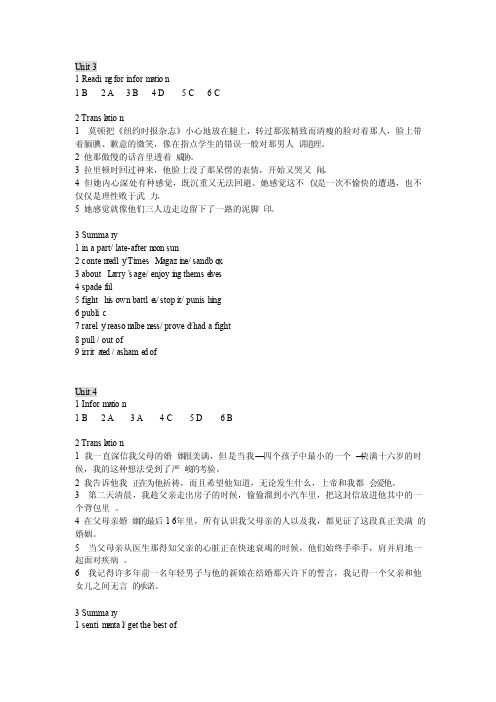
Unit 31 Readin g for inform ation1 B2 A3 B4 D5 C6 C2 Transl ation1 莫顿把《纽约时报杂志》小心地放在腿上,转过那张精致而清瘦的脸对着那人,脸上带着腼腆、歉意的微笑,像在指点学生的错误一般对那男人讲道理。
2 他那傲慢的话音里透着威胁。
3 拉里顿时回过神来,他脸上没了那呆愣的表情,开始又哭又闹。
4 但她内心深处有种感觉,既沉重又无法回避。
她感觉这不仅是一次不愉快的遭遇,也不仅仅是理性败于武力。
5 她感觉就像他们三人边走边留下了一路的泥脚印。
3 Summary1 in a part/ late-aftern oon sun2 conten tedly/ TimesMagazi ne/ sandbo x3 about Larry’s age/ enjoyi ng themse l ves4 spadeful5 fight hi s own battle s/ stop it/ punishi ng6 public7 rarely/ reason alben ess/ proved/ had a fight8 pull / out of9 irrita ted / ashame d ofUnit 41 Inform ation1 B2 A3 A4 C5 D6 B2 Transl ation1 我一直深信我父母的婚姻很美满,但是当我—四个孩子中最小的一个—快满十六岁的时候,我的这种想法受到了严峻的考验。
2 我告诉他我正在为他祈祷,而且希望他知道,无论发生什么,上帝和我都会爱他。
3 第二天清晨,我趁父亲走出房子的时候,偷偷溜到小汽车里,把这封信放进他其中的一个背包里。
4 在父母亲婚姻的最后16年里,所有认识我父母亲的人以及我,都见证了这段真正美满的婚姻。
- 1、下载文档前请自行甄别文档内容的完整性,平台不提供额外的编辑、内容补充、找答案等附加服务。
- 2、"仅部分预览"的文档,不可在线预览部分如存在完整性等问题,可反馈申请退款(可完整预览的文档不适用该条件!)。
- 3、如文档侵犯您的权益,请联系客服反馈,我们会尽快为您处理(人工客服工作时间:9:00-18:30)。
阅读教程第三册答案Unit 1I.Reading for information1. D2. C3. B4. A5. B6. CII. Translation1.今天你们将离开培育你们的学术环境,直面真实的世界。
2.你们即将离开学校,终于可以开始接受教育了。
3.想找到一位保守的教授,那比要找到一个雪人还难。
若想挑战一些有关政治正确性的正统观点,那你将会被冠以一些难听的名号。
4.如果你不相信我的话,那不妨去问一问那些因追随网络公司是通往财富之路这一理论而破产的人们。
现实击碎了他们的梦想。
5.因此,欢迎你来到我们生活的这个理性的世界。
一旦你把那些不切实际的幻想拒之门外,你就会发现这个世界并不是太糟。
III.summary1.emerge from, face the real world, go aboutmitment to, benefit from3.the enjoyment of reading, was associated with4.reality, theory, realist, in theory5.wishful thinking, go for, wind up with, twist and turnsUnit 2I. Reading for information1.B2.A3.D4.C 5 .B 6.DII. Translation爱是再简单不过的事,这一观点至今仍然十分盛行,尽管大量事实都对此予以否定。
几乎找不到任何一种活动、任何一项事业像爱情这样满怀希望地开始,又频繁地以失败而告终。
如果换了别的事情,人们一定会急于知晓失败的原因,思量如何才能做得更好,或者干脆放弃。
既然人们永远不可能放弃爱情,那么要战胜失败,似乎就只有一个办法可行,那就是探究失败的原因,进而领会爱的真义。
III. Summary1.a matter of chance, learned about2. is based on , primarily, how to be loved3. assumption, the right object4. leading to, initial excitement, permanent state5. theoretical knowledge, the mastery of the artUnit 3I.Reading for information1. B2. A3. B4. D5. C6. CII. Translation1.莫顿把《纽约时报杂志》小心地放在腿上,转过那张精致而清瘦的脸对着那人,脸上带着腼腆、歉意的微笑,像在指点学生的错误一般对那男人讲道理。
2.他那傲慢的话音里透着威胁。
3.拉里顿时回过神来;他脸上没了那呆愣的表情,开始又哭又闹。
4.但她内心深处有种感觉,既沉重又无法回避。
她感觉这不仅仅是一次不愉快的遭遇,也不仅仅是理性败于武力。
5.她感觉就像他们三人边走边留下了一路的泥脚印。
6.“如果你管不了这孩子,我来管,”莫顿一边愤愤地说,一边向着儿子迈了一步。
II.Summary1.in a park; late afternoon sun2.contentedly; Times Magazine; sandbox3.about Larry’s age; enjoying themselves4.spadeful5.fight his own battles; stop it; punishing6.public7.rarely; reasonableness; proved; had a fight8.pull; out of9.irritated; ashamed ofPart II Reading for pleasureExercisesI.Answer the following questions.1. Why did the woman quicken her steps after she saw the author behind her? Because it seemed to her that the author who was a young black man, was too menacingly close to her and made her feel nervous.2. What does “language of fear” mean in Line 31?It means the way in which people express their fear. In most cases, it is not a verbal expression, but an action such as hammering down the door locks of the car, crossing to the other side of the street rather than passing the author in a deserted street.3. Why was the author not conscious of the threat he posed to pedestrians before he was 22?Because in the place where he grew up, there were a lot of gang warfare, street knifings, and murders, and he was not one of the bad boys.4. How does the author feel about his being mistaken for a criminal?He gradually learns to smother the rage and make himself seem less threatening. 5. According to the author, what is the most effective way to reduce tension people feel in his presence?He believes that whistling melodies from famous composers like Beethoven and Vivaldi can reduce the tension, because people know that a mugger will not do that.Unit 4I Reading for informationI. 1. D 2. A 3. B 4. C 5. D 6. AII.Translation1.我们忽略了绝望的婚姻以及那钻心的孤独感。
2.她那样做着,数年如一日,在入夜之后,在她已记好了账目、支付了账单、照顾好发疼的嗓子,并确保我们已经吃过晚饭之后。
3.实际上,这是对爱的本质进行判断。
4.我们营造了安全,又受困于这种安全。
5.假如作为一个孩子我觉得被剥夺了什么,那仅仅是在有人用一个家应该如何的标准对我们家惊醒衡量的时候。
而事实上,我们几乎什么都不缺。
III.Summary1. perfect family lovely children2. stayed married made a bargain in any way3. got divorced uncommon4. something different trash cans neighborhood5.t he Department of Social Services rules apply6. counseled make their own choices7. neglect8. judged a fit mother a clean floor an unbalanced mealstandards9. lacked for10. manage their families loveUnit 5I.Reading for information1. B2. D3. A4. A5.C6. BII. Translation1.每年,我们都有很多人翻开婚姻的篇章,追求更美好的生活。
2.每年大约有一百万起离婚,这就意味着每年大约有一百万个18岁以下的孩子成为离婚家庭的孩子。
3.其一就是认为离婚对孩子造成的危害只是暂时的,只限于离婚之时,只要父母幸福了,孩子们也会幸福这样的错误观念。
4.在20世纪四十年代,在我们所生活的布朗克斯的工人阶级社区,离婚基本上是闻所未闻的事儿,是只会发生在那些有钱人或者好莱坞影星身上的事儿。
5.他说,“当离婚发生时,我们这些孩子就不再是父母优先考虑的对象了;那时,他们双方都开始为自己打算。
那是一个家庭的解体,非常令人难过。
我要做的就是告诫父母,要做这样的决定一定得慎重,如果可能,就尽量避免离婚。
6.既然我们的文化不愿意考虑离婚的后果,那么我希望:我们开始奉行一条准则,即成功的离婚就像美满的婚姻一样,也需要付出辛苦和努力。
III. Summary1.turn the page on2.grabs people by the collar, bringing home3.By and large, radar screens4.staggering, sense of national crisis5.trouble-free, self-delusion6.for the sake of, exerted a tempering influence, benefit7.embedded8.counseling, hang out with, takes hard workUnit 6I.Reading for information1. B2.A3.C4.C5.D6.CII. Translation1.我定了个规矩,尽可能避免担任任何会被某公众团体审阅的文件的起草人。
2.如果国王未尽其应尽之职,保护臣民的生命与财产, 反而肆意毁坏他们的生命或财产,那么这样的国王就不再是国王,而是暴君,臣民将不再效忠于他。
3.他将自己的论证建立在一种尊重人民意愿的,由政府和被统治者共同达成的协议之上,这种论证的方式可能比富兰克林更老练。
4.在后来所谓的“休谟之叉”理论中,这位伟大的苏格兰哲学家提出了一种理论,对“合成型”事实和“解析型”事实进行区分。
“合成型”事实对事实进行描述(如“伦敦比费城大”),“解析型”事实是经由推理和定义证明的事实(如“三角形的内角之和是180度”,“所有单身汉都未婚”)。
